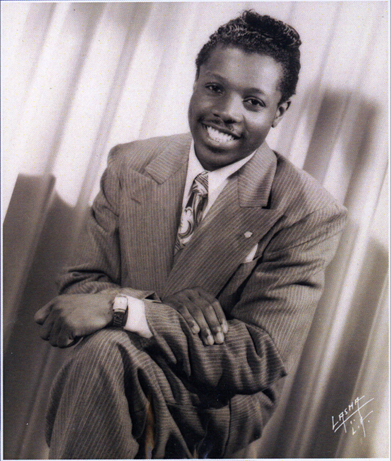

Revision note:The last living musician to be featured individually here at RSRF, King Fleming died on April 1, 2014. He was 91 years old. Our thanks to his son Kevin Fleming and to Joanie Pallatto for the news, and to Joanie Pallatto for the autographed King Fleming sheet music and her accounts of the making of King Fleming's two Southport CDs. With permission from Kevin Fleming, Alvin Carter-Bey, and Joanie Pallatto, we have added photos from his memorial service, which took place on April 21, 2014, and from its lavishly produced program. We have also added further material on King Fleming from the Chicago Defender. We have added the Fresh Sounds reissue of King Fleming's 3 Argo/Cadet LPs on a 2-CD set; this is the only reissue to date of his last LP for the Chess brothers, The Weary Traveler. We have added information about CD reissues from the first Johnny Alston session (Flem2). We have recently gotten better information on George Green's private-issue LP, which it turns out is from 1977 or 1978. One of its titles, at least, is George "Stardust" Green and His Song Book, and it includes three previously unknown tracks with King Fleming. We have provided a correct release date for King LP542, This Is Lorez, which was out in June 1957.
Pianist Walter Fleming was born on the North Side of Chicago, in the Sedgwick/Wells neighborhood, on May 4, 1922. (King Fleming preferred not to talk about his age; the date comes from a card file of Musicians Union Local 208 members now kept in the Chicago Public Library.) According to a Chicago Defender profile (Al Duckett, "King Fleming Ork Sets Pace with Unique Sock," July 10, 1956, p. 19), he was "One of 10 children of Estella and Ferd [sic] Fleming." He was, to be precise, the fifth of ten children. Walter began to learn music from his older brother Fred when he was 8 years old; after some years of playing by ear, he started getting formal instruction in classical and religious music when he was 15. He graduated from McKinley High School on the West Side; McKinley was not famous for its music program, but George "Sonny" Cohn, long-time lead trumpeter for Red Saunders and Count Basie, was one of his classmates. Fleming recalled that he first learned about jazz chord progressions from a friend named "Butch." He played trombone in the high school band but felt that it was never really his instrument. Later on, he studied at the Midwest College of Music.
Sonny Cohn explained the origin of the "king" as follows: "His real name is Walter and I still call him Walter, although he prefers to forget that now. He's about my age and when he started out he wanted to be called 'Keen' but everybody just seemed to take it for 'King' so he adopted that name" (See Peter Vacher, "The Sonny Cohn Story," Jazz Journal, September 1963, p. 4).
The first King Fleming band that we know of was in operation in 1939, the year that Fleming graduated from McKinley. According to Sonny Cohn in the Peter Vacher interview, "The personnel of the band was Johnny Thompson, alto and clarinet (he plays tenor now), James Couch, alto, who acted as our business manager (he's very prominent in Chicago today: he has two or three liquor stores and apartment buildings), James 'Tom' White, tenor, Harold Tyler and myself, trumpets, Wilbur Hathaway, trombone and also piano (he lives in California now, still in the music business). Our drummer was Leroy, I forget his surname: he was from the same side of Chicago as the rest of us but he was replaced by a fellow named Dan Deans, who was pretty good. King Flemming [sic] played the piano" (Vacher article, p. 4). Sonny Cohn was just 14 years old at the time; Johnny Thompson was probably 13.
Cohn described the band as follows: "This was one of the best up and coming bands in Chicago, and working with it really convinced me that music was going to be my life. This was around 1939 and I was still in high school. Although it was a small band it felt like a big band. We had two trumpets, a trombone, three saxes, piano and drums. Bass was added later. We used to work at the Edie Park Theatre House as a steady job, every Wednesday from 7 to 12. All the kids from the different high schools would come along and pay their 15 cents admission; at the end of the evening we'd split the take among all the fellows in the band. When we first started, we'd usually go home with 15 to 25 cents. But it grew and we'd end up with 2 or 3 dollars for each guy, which was good when you were going to school" (Vacher, p. 4).
We don't know exactly when King Fleming enrolled in the Midwest College of Music, but the absence of publicity for his band from 1940 and then from most of 1941 provides a clue.
King Fleming first appeared in the Chicago Defender on September 27, 1941, in an announcement for a get-together on October 3 by the Steel Mill Aces, a social club that would meet for drinking and eating at the Greater Fort Dearborn Hall (3902 South State). "Good music will be played by King Fleming's Band." Obviously, he had not graduated to night clubs yet. As Cohn noted, "The band continued to work together for a couple of years and then it broke up because some of the guys wanted to join the Union and some didn't. I didn't join because I felt I wasn't ready; I was still in high school and I felt a little afraid of the idea" (Vacher, p. 4).
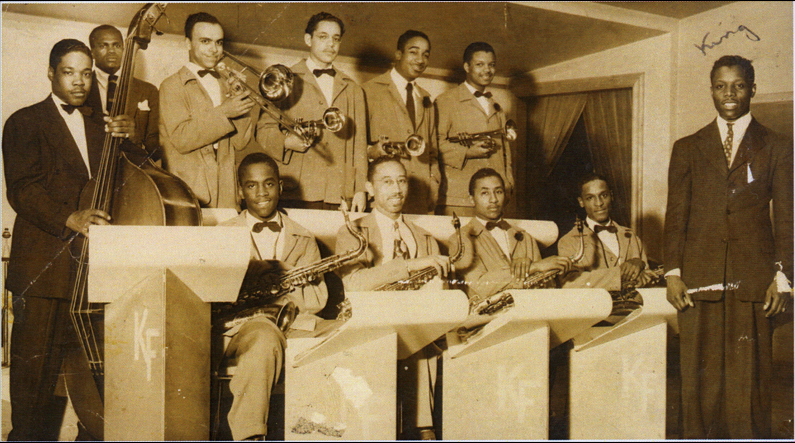
In the Fall of 1942, King Fleming began leading a Swing band that quickly became a powerful draw locally. According to Jay Peters in an interview with the late Otto Flückiger, the lineup was James Robertson, "Fip Fortunato" (i.e., Fortunatus Paul "Fip" Ricard), Arthur Reed (trumpets); Charles Hathaway (trombone); Richard Overton, Leroy … (alto sax); James Peters, Tom White [later replaced by Johnny Thompson] (tenor sax); King Fleming (piano); "Hog" Mason (bass); and Dan Parker (drums). A photo that survives also shows an 11-piece band, albeit with a different lineup. However, King Fleming said that his new band grew over time to 18 pieces; when interviewed by Robert Campbell, he said he still had the arrangements.
The first Chicago Defender advertisement for the band appeared on September 5, 1942, when the band was playing Martin's Corner (1900 West Lake Street); an "indefinite" contract for Walter King Fleming was accepted and filed by Local 208 on October 1. Every week through the December 12 issue, there was a Martin's Corner ad: "dance to the music of King Fleming and His Swing Band." The September 5 ad ran "King Fleming and His Swing Band" in the same size type as the other performers on the bill. By December 12, his name was appearing in a font size four times bigger than any of the others (Oliver "Gingerale" Street, the MC; Johnny Mosely, a boogie pianist; Lilly Mae "Kerkmond," blues singer; and Jackie and Virgil, dance team). The club clearly thought he had developed into quite a draw. Also on December 12, the first Defenderstory appeared concerning a dance that Fleming's band was working for the Beau Brummells Club, an organization newly founded by McKie Fitzhugh (who would later become famous in Chicago as a DJ, and ultimately as the proprietor of McKie's Disc Jockey Lounge). This dance, billed as a "Midnight Ramble," took place in Union Park on the West Side.
The Defenderran many ads for the King Fleming band during 1943, all for events under McKie Fitzhugh's sponsorship. On January 10, 1943, a Sunday dance took place at the Parkway Ballroom, 45th and South Parkway; it was sponsored by the Beau Brummells Club and featured King Fleming's Orchestra. On February 5, a "Coronation Ball" at the Parkway Ballroom featured Dyett's DuSableites ("King of Local Bands") and King Fleming's Band ("Runner-up") "In A Battle of Jazz-nocracy". Another staged "battle of jazz" took place at the same venue on February 21. On March 5, King Fleming's Orchestra played the "All Hi-School Nite" dance at the Parkway; a blurb in the Defender declared that "The 'King' is extremely popular with the jitterbugs of Chicago." On March 14, King Fleming was again the headliner for the Beau Brummells' regular Sunday dance. On March 27, the band handled the Saturday Spotlight Dance for the Bronzevilleites at the Parkway. On Friday April 9, the band returned for the Beau Brummells' 2nd Annual Sport Dance.
On Saturday April 10, King Fleming's Orchestra took second billing at a Beau Brummells' affair, after Jay McShann and His Decca Recording Orchestra featuring Walter Brown. For a Beau Brummells' Easter dance on April 25, and again for the Mother's Day Ball on May 9, King Fleming and Dyetts' DuSableites shared the bill. One of the ads styled the band "King Fleming's Kings of Swing." On May 15, King Fleming, the DuSableites, and George Rhodes participated in the "Saturday Nite Band Parade," and on May 18, the White City Ballroom (63rd and South Parkway) put on a "Swingsational Dance and Cabaret Party with a Parade of Bands": Count Basie, King Fleming, and Dyett's DuSableites (see also "Chicago Awaits Count Basie 'King of Swing'," Defender, May 15, 1943, p. 19). On Sunday May 23, the Beau Brummells sponsored King Fleming's Birthday Ball. On Saturdy June 19, the Beau Brummells crowned "Miss Hi-School Grad"; King Fleming had to be content, on this occasion, with the undercard to Louis Jordan and his Tympany Five.
Over the Fourth of July weekend at the Parkway Ballroom, King Fleming's Orchestra played the Twilight Sport Dance on Monday July 5 (the Sunday dance was handled by the DuSableites and the Dukes of Swing). On July 17, the Defender ran a photo of King Fleming signing an agreement to play 3 more Sunday dances at the Parkway Ballroom; McKie Fitzhugh, president of the Beau Brummells, appears to Fleming's left.
King Fleming was about to be inducted into the Army, changing "his civies to the army khaki for the duration," as the Defender announced on July 24. On July 25, King Fleming's Orchestra played another Blackout Dance at the Parkway, and on Friday July 30, King Fleming and His Orch. played "His Very Last Engagement"; he was inducted on August 3. However, the band continued to work the Parkway Ballroom under his name while Richard Overton (alto sax) took over the leadership. The Fleming band played dances at the Parkway on August 15, September 5, and October 3 ("Wear Your Zoot Suit"). On October 29, King Fleming's Stompers under Richard Overton's leadership went into the Rhumboogie Club (343 East Garfield) where they shared a show with Rhythm Willie, Ross & McClain, the Edwards Sisters, Lillian Fitzgerald, and Joe "Ziggy" Johnson; their contract was accepted and filed by Local 208 on October 21. According to Jay Peters, this band broke up soon afterward because so many of the musicians were drafted into the Army. As nearly all of King Fleming's musicians were replaced, Carroll Dickerson was put in as the leader by Local 208 and the aggregation evolved into the ill-fated Rhumboogie "Dream Band," which lasted until June 1944 (see our Tom Archia page for its history). Overton was out and Dickerson in as the leader by November 24, 1943.
After his discharge from the Army, King Fleming spent some time in Los Angeles (late 1945 through the fall of 1946). He got his first recording opportunities there, accompanying R&B singers for small labels, as well as a few "good jazz singers" (as he told Robert Campbell). Here are the four sessions that we know of; there may be others.
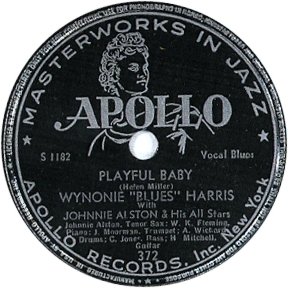
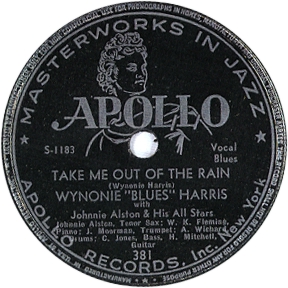
Wynonie Harris (voc); Jimmy Moorman (tp -1); Johnnie Alston (ts); Walter "King" Fleming (p); Herman "Tiny" Mitchell (eg); Clarence Jones (b); Al "Cake" Wichard (d).
Los Angeles, December 1945
| S 1182 | Playful Baby (Miller) -1 | Apollo 372, Route 66 [Swe] KIX-30, Delmark DD-657 [CD], Delmark DD-683 [CD] | |
| S-1183 | Take Me out of the Rain (Harris) -1 | Apollo 381, Route 66 [Swe] KIX-30, Delmark DD-683 [CD] | |
| S 1184 | Papa Tree Top (Harris) | Apollo 372, Route 66 [Swe] KIX-30, Delmark DD-683 [CD] | |
| S-1185 | Young and Wild (Harris) -1 | Apollo 381, Delmark DD-683 [CD] |
Apollo 372 and 381 were 78-rpm singles released at the time. Route 66 KIX 30 was a Swedish LP from the 1980s. All tracks were reissued in 1996 on Delmark CD DD-683, Everybody Boogie. "Playful Baby" previously appeared on the various-artists CD Delmark DD-657, West Coast Jive. Thanks to Dave Penny and Mario Schneeberger for information about this session.
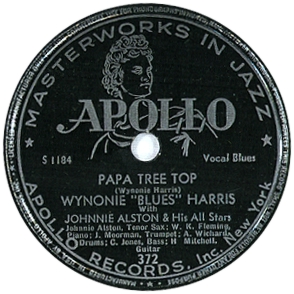
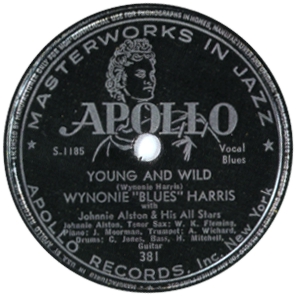
"Playful Baby" includes a solo by King Fleming. Otherwise Johnny Alston is the dominant soloist, though Moorman is heard on trumpet on "Young and Wild" and Mitchell has a guitar solo on "Take Me out of the Rain."
King Fleming recalled making this session. He told Robert Campbell that "Tiny" Mitchell was a good guitarist who, of course, weighed around 340 pounds.
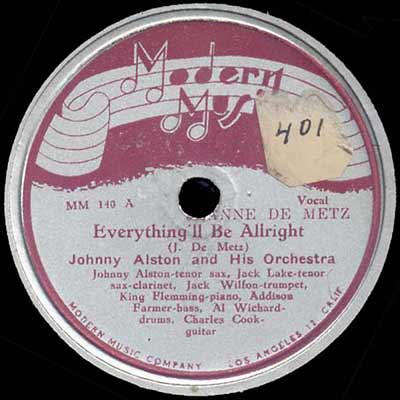
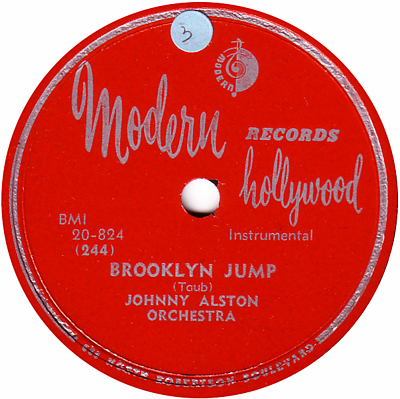
Jack Wilson (tp); Jack Lake (cl, ts); Johnnie Alston (ts); King Fleming (p); Charles Cook (eg); Addison Farmer (b); Al "Cake" Wichard (d); Jeanne De Metz (voc); unidentified male (voc).
Los Angeles, late 1945
| MM-243-1 | Everything'll Be Allright (De Metz)# [JDM, ens voc] | Modern Music 140 A, Blue Moon BMCD 6049, Ace CDCHD 1322 | |
| MM-244-1 | Brooklyn Jump ("Taub")^ | Modern 20-824, Blue Moon BMCD 6049 | |
| MM-245-1, MM-265-1^ | Ecstacy [sic] (Alston)# [Blue Nocturne ("Taub")^] | Modern Music 140 B#, Modern 20-824^, Blue Moon BMCD 6049 | |
| MM-263-1 | Mr. Fine (Marcel La Mayes) [JDM voc] | Modern Music 144B, Blue Moon BMCD 6049 | |
| MM-267-2 | Red Light (Red Callender) [JDM, unidentified male, ens voc] | Modern Music 144A, Blue Moon BMCD 6049 |
Our basic information comes from Leadbitter and Slaven's Blues Records 1943-1970 Volume 1, the 1987 edition (under Johnny Alston, Tom Lord's Jazz Discography lists only Modern 824 and gives no details on it). Modern Music 140 and 144 were singles released at the time; Modern 20-824 followed in the late 1940s.
The label for MM-267-2 gives Jeanne De Metz as the vocalist; our check of a copy of Modern Music 144 in Otto Flückiger's collection (and the CD reissues) reveals an unidentified male vocalist as well. There are no vocals on Modern 20-824.
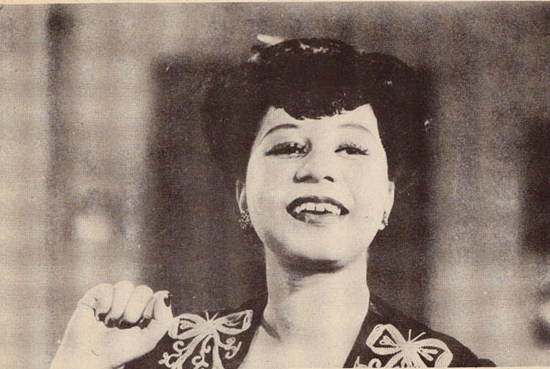
We know just a tiny bit about Jeanne De Metz. A one-page profile on her appeared in The Spotlighter (August 1944, p. 10), according to which she was born in Brooklyn, had appeared in one film and was about to start on another, and sang and did comedy "in various swanky spots" in the Los Angeles area. It boldly predicted, "if I am not mistaken, this lady, in a year or so, will definitely make the top of the ladder..." Which did not happen—neither did the promised future installments of her story in The Spotlighter—but she did appear on at least the two Johnny Alston sessions.
Our thanks to Dani Gugolz for catching the fact that "Blue Nocturne" and "Ecstasy" are the same performance. The Bihari brothers, who owned Modern, weren't above issuing numbers with different titles in the hope of coaxing more sales out of them. Thanks also to Gugolz for the composer credits on Modern Music 144 and Modern 20-824.
Note the pseudonym "Taub" for one of the Bihari brothers on "Brooklyn Jump"; this was a routine device at Modern for funneling composer royalties into the owners' pockets.
Blue Moon BMCD 6049, Juke Box R&B 1945-1946, was released in June 2005. The other tracks on this CD feature the complete works of Cal Lucas, Sylvester Scott and Ollie Jackson for Art Rupe's first label, Juke Box.
Ace CDCHD 1322 was a various-artists collection titled Further Mellow Cats 'n' Kittens: Hot R&B and Cool Blues 1946-1951. It was released in 2011. All tracks were originally recorded for the Modern label.
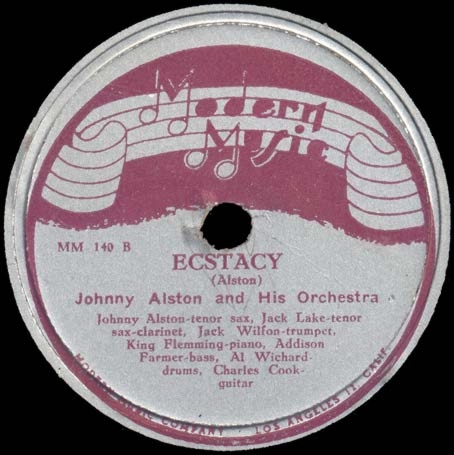
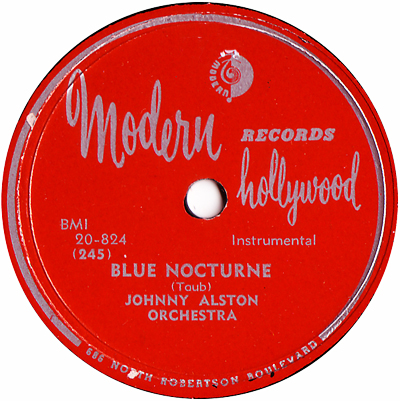
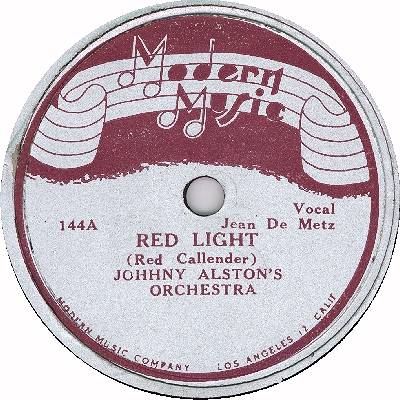
On "Ecstasy" (subsequently retitled as "Blue Nocturne"), there is an intro by King Fleming and solos by Johnny Alston, Jack Wilson, Fleming, and Jack Lake (on clarinet). "Everything'll Be Allright" features a piano intro by Fleming and a 12-bar tenor sax solo (probably by Alston) plus a tenor obbligato behind Jeanne De Metz' vocals (there is also some handclapping by members of the band). "Brooklyn Jump" has solos by King Fleming, Charles Cook, and Johnny Alston. "Mr. Fine" features Alston only. "Red Light" has an intro and two solos by Fleming; there are also solos by Alston and Cook, and a drum break at the end for "Cake" Wichard.
Jack Wilson (tp); Johnny Alston (ts); unidentified (as, bars); King Fleming (p); Charles Cook (eg); Addison Farmer (b); Al "Cake" Wichard (d); Jeanne De Metz (voc -1); George Vann (voc -2); ensemble (voc -3).
Los Angeles, late 1945 or 1946
| AT-220 | Weary Blues-1 | Atlas 139, Blue Moon BMCD 6049 | |
| AT-221 | Found a New Baby | Atlas 138, Blue Moon BMCD 6049 | |
| AT-222 | Sam the Boogie Woogie Man -1, 3 | Atlas 139, Blue Moon BMCD 6049 | |
| AT-223 | Careless Love -2 | Atlas 138, Blue Moon BMCD 6049 |
Our basic information comes from Leadbitter and Slaven 1987, although they miss the ensemble vocal on AT-222 and give its title as "Saw the Boogie Woogie Man." Atlas 138 and 139 were 78-rpm singles released at the time; the company was an LA-based forerunner to the much better known Specialty label.
Existing discographies leave out the second saxophonist, who doubles on alto and baritone; when interviewed by Robert Campbell, King Fleming did not recall his name. The only instrumental solo on "Weary Blues" is by the altoist. "Sam" has solos by King Fleming and Johnny Alston.
Blue Moon BMCD 6049, Juke Box R&B 1945-1946, was released in June 2005. The other tracks on this CD feature the complete works of Cal Lucas, Sylvester Scott and Ollie Jackson for Art Rupe's first label, Juke Box.
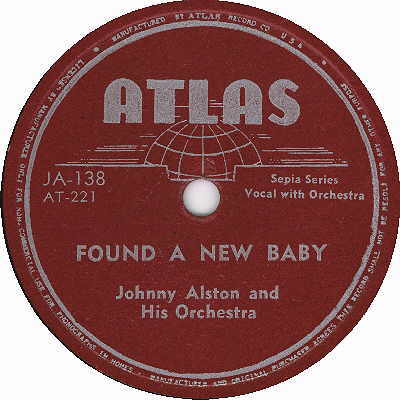
King Fleming next moved over to a Swing-oriented combo led by a musician who had recently relocated from Chicago to Los Angeles.
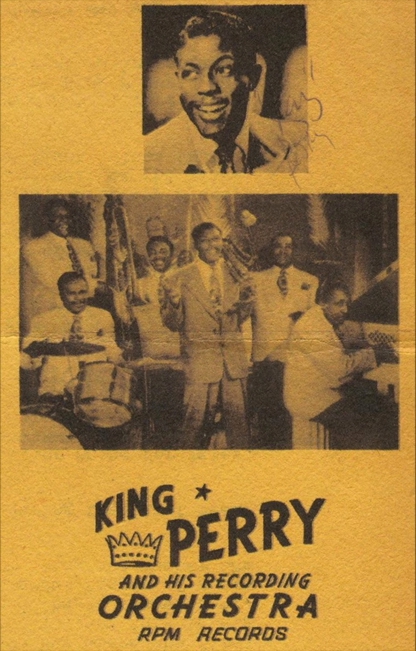
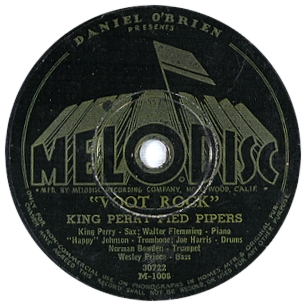
Norman Bowden (tp); George "Happy" Johnson (tb); Oliver "King" Perry (cl -1, as -2, voc -3); Walter "King" Fleming (p); Wesley Prince (b); Joe Harris (d).
Los Angeles, c. April 1946
| 30716 | Laughing at Life -1, 2, 3 | Melodisc 1007, Classics 5081 [CD], Acrobat ADDCD 30666 | |
| 30721 | Till the Very End of My Days -1, 2, 3 | Melodisc 1007, Classics 5081 [CD], Acrobat ADDCD 3066 | |
| 30722 | Voot Rock -1 | Melodisc 1006, Classics 5081 [CD], Acrobat ADDCD 3066 | |
| 30724 | Mellow Reeni Riff -1 | Melodisc 1005, Classics 5081 [CD], Acrobat ADDCD 3066 | |
| 30726 | Baby Baby Blues -1, 3 | Melodisc 1006, Classics 5081 [CD], Acrobat ADDCD 3066 | |
| 30728 | Puttin' You Down Blues -1, 2, 3 | Melodisc 1005, Classics 5081 [CD], Acrobat ADDCD 3066 |
Thanks to Dave Penny for information about this session. Melodisc 1005, 1006, and 1007 were 78-rpm singles released at the time. King's name is spelled "Flemming" on the labels to Melodisc 1005 and 1006.
All of the released sides from this session were reissued in January 2004 on Classics 5081, King Perry 1945-1949. There is probably no way to trace the missing matrix numbers—Melodisc went out of business after its warehouse burned down. Classics credits Perry with playing tenor sax and clarinet on this session, but the only saxophone that can be heard is an alto (an occasional gritty passage in the bottom register—for instance, around halfway through "Voot Rock"—could mislead the listener into thinking that Perry had switched to tenor).
Acrobat ADDCD 3066 is a 2-CD set, issued in Britain in 2010 under the title Melodisc Records of Hollywood 1945-46.
King Perry was basically a Swing musician, as can discerned from "Laughing at Life," which features his alto sax and clarinet solos along with a Swing vocal. The sentimental ballad "Till the End of My Days" allows Perry to do his Hodges thing on the alto sax; he croons the vocal rather drearily. "Rock" and "Riff" are jump-band instrumentals; "Riff" in particular is reminiscent of some of Hodges' small band sides. "Baby Baby Blues" is well played but partly undermined by the inane lyrics that Perry sings. On "Puttin' You Down," the lyrics are much improved, and the leader does a passable Louis Jordan impression. King Fleming is prominent on all six sides, and gets brief solos on "Mellow Reeni Riff" and "Baby Baby Blues."
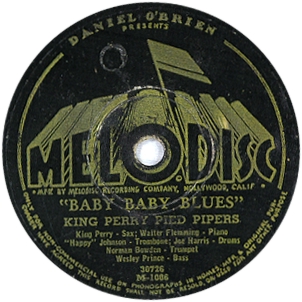
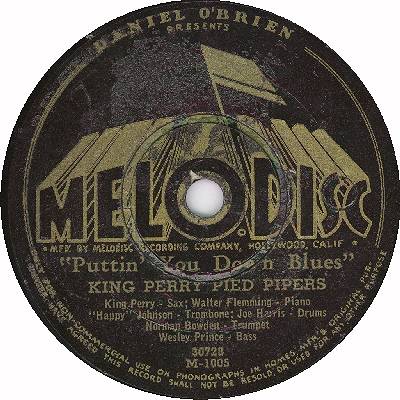
Oliver "King" Perry was originally from the Chicago area, where he had no doubt met Fleming before he was drafted. Perry was born in Gary, Indiana, in 1920. His first instrument was the violin; he later learned how to play trumpet, piano, bass, and drums. He took up the alto sax in the mid-1930s, under the dual inspirations of hearing Johnny Hodges and joining a band, the Steel City Melodians, that needed a saxophonist. After studying piano and arranging at Storr College in West Virginia, he returned to Chicago to lead his own combo. According to Detroit newspaper articles cited by Jim Gallert, King Perry and his band were brought from Chicago to open Club Congo in Detroit on July 5, 1941.
The King Perry group was on the Chicago scene in 1943 and 1944. On June 17, 1943 he posted a contract with Local 208 for 2 weeks with options at the Barrel of Fun. In April 1944, he surfaced at the 1111 Club (2 week contract, with options, posted on April 6). On July 6, 1944, his contract for 19 days at the Band Box (a Loop nightclub that featured jazz) was accepted and filed by Local 208; he must have gone over well with the patrons there, because on August 3 he posted another "indefinite" contract. Then in early September Perry moved to Cafe de Society for 2 weeks (contract accepted and filed September 7). Perry and his quintet then took a long engagement accompanying the Ice Capades.
In 1945, they joined a package tour that took them (along with Dorothy Donegan, Scatman Crothers, and the King Cole Trio) to Los Angeles, where they were stranded. Perry's band quickly established itself in Southern California, first recording for Melodisc in July 1945; the session that Fleming participated in was the band's second for the label. After Fleming moved back to Chicago, Perry continued to record for such companies as Excelsior, DeLuxe, Specialty, Dot, and RPM. But recording opportunities dried up after 1954, and in the late 1950s, Perry left music to became a real estate agent. He also operated a record company called Octive. After retiring from real estate sales in the early 1980s, King Perry returned to playing part-time around Bakersfield, California.
King Fleming seems to have returned to Chicago in November 1946. A note in Otto Flückiger's files, with Jay Peters as the most likely source, gives the personnel of King Fleming's Four in Chicago, November 1946 through August 1947, as King Fleming (piano), Jay Peters (tenor sax), "Hog" Mason (bass), and Tommy Hill (drums).
On January 16, 1947, King Fleming had his "indefinite" contract with the Macomba Lounge accepted and filed with Musicians Union Local 208. This particular gig seems to have lasted about a month; the Fleming combo was replaced by Tom Archia's trio. The Chicago Defender for February 15, 1947 included an ad for Frank's New Caravan Club (at 218 West Oak). King Fleming and His Trio were featured at a big black and tan show presented at this near North Side club. The show was called "Variety in Jazz"; it also featured Dallas Bartley (headliner), Dovie Williams (blues singer), another singer, and two dance acts. Down Beat for June 18, 1947 mentions King Fleming's Four with Jay Peters on tenor sax.
On June 22, 1947, King Fleming married Cornelia Jones. They would have two sons (Kevin and Dwight) and a daughter (Adrienne).
On July 3, 1947, King Fleming's "indefinite" contract with the Oasis Club was accepted and filed by Musicians Union Local 208. On August 7, 1947, Fleming posted an "indefinite" contract with the Ritz Lounge. On December 4, 1947, Fleming posted a contract for 2 weeks plus an option at Club Playtime.
On February 19, 1948, King Fleming posted a 1-week contract with the Tailspin Lounge. Then he was either out of town or working for another leader for several months. On September 16, 1948, he resurfaced with an indefinite contract at the Red Moon Lounge. During 1949, King Fleming was on the road most of the time, as he is absent from the Local 208 contract lists. One place we can say he was, from ads in the local newspaper, was Decatur, Illinois. King Fleming, then working wth a bassist, was at the Loeb's Theatre Lounge for a week (Decatur Daily Review, July 25, 1949, p. 13). Fleming reappeared on the South Side scene in December 1949.
He was the sole performer at the 1949 Christmas Eve Ball sponsored by the Rib Joint, which took place at the Union Temple (Washington Boulevard and Union Avenue)—see the Defender for December 17, 1949. Just a little earlier, Fleming had gone into Jimmy's Palm Garden, with a group led by Dallas Bartley (Bartley signed a contract for 6 weeks, with an option for 6 months; it posted on December 15, 1949). We learn from the March 24, 1950 issue of Down Beat who was in the Dallas Bartley Quartet, still at Jimmy's Palm Garden in Chicago on that 6-month contract: Dallas Bartley (bass), Johnny Thompson (tenor sax), King Fleming (piano), and Oliver Coleman (drums). Fleming and Coleman stayed on the gig for several more months; Dallas Bartley was fired from the job in late May 1950, after failing to show up for work on three occasions. (The action was upheld by the Musicians Union Local 208 Board on June 1, 1950.) King Fleming also appeared as a session pianist with the Dozier Boys in their recording session for Chess in the summer of 1950. This was his first known recording session in Chicago.
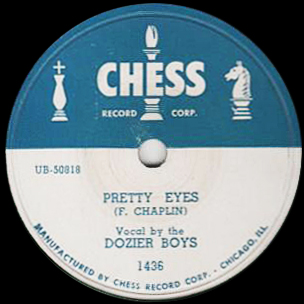
unidentified (tp -1); Harlan "Booby" Floyd (tb -1); unidentified (ts -1); King Fleming (p); Bill Minor (lead tenor, d); Eugene Teague (tenor voc, eg); Cornell Wiley (lead tenor/baritone voc, b); Benny Cotton (bass voc, tipple).
United Broadcasting Studios, Chicago, c. August 1950
| UB50817 | You Got to Get It (Dave Smith) -1 | Chess 1436, MCA 380-596 [CD] | |
| UB50818 | Pretty Eyes (F. Chaplin) | Chess 1436 |
Matrix numbers, titles, and original release from Lord, with confirmation from a copy in the collection of George Paulus. Cornell Wiley and Benny Cotton identified the session pianist and trombonist (see the Dozier Boys page for the history of this vocal group. The session trumpeter and tenor saxophonist took no solos and remain unidentified.
Chess 1436 was a single released in September 1950. It was the first vocal group record to be issued on the new label, and is a very rare item on the collectors' market today. "You Got to Get It" was reissued for the first time in 1999 on Chess MCA 380-596, a 15-CD extravaganza titled The Chess Story 1947-1975. Bill Minor sings the lead on "Pretty Eyes"; he and Benny Cotton alternate on "You Got to Get It." King Fleming knew the uncle of one of the Dozier Boys.
The Defender on October 28, 1950 ran a photo of Oliver Coleman's Palmaires at Jimmy's Palm Garden, 804 Oakwood Boulevard. The group by this point consisted of Nelson Berry (tenor saxophone), King Fleming (piano), Sylvester Hickman (bass), and Oliver Coleman (drums). According to the blurb, the Palmaires had been "pulling them into" the club since May, when Coleman took over from Dallas Bartley (Coleman was identified as the leader on a new contract for 6 months, which posted on July 6). The Coleman group was indeed pulling them in; on January 18, 1951, Coleman's contract for 3 more months at the Palm Garden was accepted and filed by Local 208. We will assume that King Fleming remained in Coleman's combo after it left Jimmy's Palm Garden; Fleming does not show up as a leader on the Local 208 contract lists for the next several months. In late April, Coleman took up at the 6312 Tavern (contract for 3 weeks with option accepted and filed on May 3; an indefinite contract followed on June 7). Around the end of June, the Coleman combo took a gig at the Hi Hat Club (indefinite contract posted on July 5).
On November 1, 1951 King Fleming was definitely back out on his own: he posted an indefinite contract with the Cotton Club (while his erstwhile employer took a job at the Cork Club). Fleming and the Cotton Club followed up with another contract on November 15.
King Fleming told Robert Campbell that between 1952 and 1955, he spent more time in Los Angeles. He was still in Chicago in the Spring of 1952, signing a 7-week contract with the 125 Club (accepted and filed March 20, 1952). In May Fleming posted contracts with the 125 Club (for an indefinite period) and the Brass Rail (also indefinite; both were accepted and filed on May 15). But we are not sure how much longer he remained in town; he does not show up again on the Local 208 contract lists for the rest of the year.
King Fleming was also recorded live at the Pershing Lounge in April. It looks to us as though this was already a vocal/instrumental group, of the sort he would be leading almost continuously from 1953 through 1959. We would have to hear the tapes to be sure. Russell Williams would be a regular member of Fleming's groups for several years, Ethel Duncan would return to the lead female vocal spot in 1955-1956, and George Green would once again be associated with Fleming in the 1960s and 1970s.
King Fleming (p, poss. voc); Russell Williams (b, poss. voc); George "Stardust" Green (d, poss. voc); Ethel Duncan (voc).
Pershing Lounge, Chicago, April 30, 1952
| unidentified titles | private recording |
According to Art Zimmerman, Dr. Jerome Love, a physician in Chicago, recorded many hours of live jazz in Chicago from 1952 to 1959. Love used a dummy head with microphones mounted at the "ears" to make binaural recordings. Each reel of tape in the Love archives holds up to thirty minutes of music. There are two tapes from this gig, yielding up to 1 hour of music. Personnel, location, and date as noted in the Love archives.
George "Stardust" Green was born in Chicago on September 6, 1923, growing up on the West Side. He served in the Army in World War Ii, returning to Chicago in 1943 to perform in clubs. He divided his career between serving as a drummer in jazz combos and fronting bands as a standup nightclub singer. By the early 1950s, he was known as "Stardust," most likely because he often sang that standard in the clubs. He joined Jimmy Binkley's trio, recording in February 1953 for Chance and singing two blues on the date. The Love archives don't credit Green with any vocals, however.
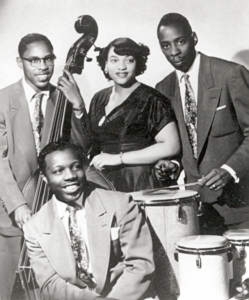
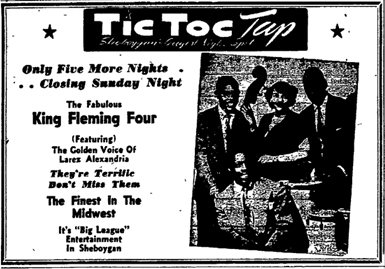
If King Fleming had been in Southern California, he was back by March 1953, if not earlier. But he was working in the suburbs, or in neighboring states. The first advertisement we have seen for the greatest King Fleming quartet (incorporating a publicity photo the group would use for several years, even after Lorez Alexandria was no longer with them) was for a gig at the Tic Toc Tap in Sheboygan, Wisconsin, on March 18, 1953. Though given her own billing in the ad, Lorez Alexandria was new enough on the scene that the Tic Toc wasn't sure how to spell her name. King Fleming reappeared on the Local 208 contract list on November 19, 1953, when his contract for 2 weeks with options at the new Club Relax was accepted and filed. In December he moved to Club Bagdad (contract posted on December 17).
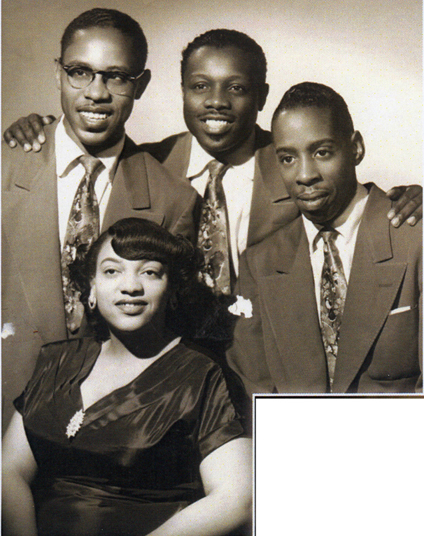
Early in the next year, King Fleming finally got to make a session under his own name, in Chicago for Blue Lake. The lineup was his regular quartet, with John Neely added on tenor sax.
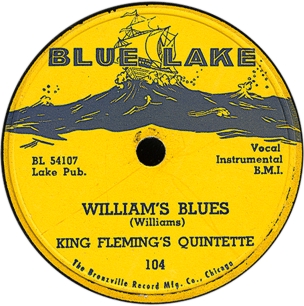
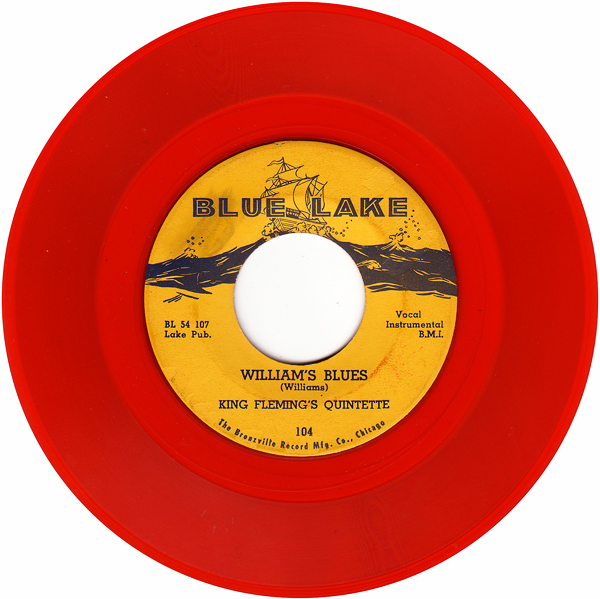
King Fleming (p, voc); John Neely (ts); Russell Williams (b, voc); Aubrie Jones (d, voc); Lorez Alexandria (voc).
unidentified location, Chicago, c. March 1954
| BL-54107 | William's Blues (Williams) | Blue Lake 104, Empire Musicwerks CD-N1 | |
| BL-54108 | One O'Clock Jump (Basie) | Blue Lake 104, Empire Musicwerks CD-N1 |
Tom Lord's Jazz Discography gives matrix numbers (those shown on the label) and release information. But he provides no personnel besides Fleming, who is playing a funky old upright. The session was definitely not made at Universal Recording; we wonder, in fact, whether it was recorded by Fleming himself, in an empty club or theater, and released as submitted by Al Benson. We got the rest of the personnel from King Fleming (interview with Robert Campbell).
"William's Blues" (as it is rendered on the label) was written by Russell Williams. Blue Lake 104 was a 78 and 45 rpm single, released in Spring 1954. For more on Parrot and Blue Lake, see our Parrot discography; the recent rediscovery of a list of Parrot and Blue Lake master tapes in the hands of Chess Records (as of 1958 or 1959) has allowed us to get more precise about the recording date. In December 2002, both sides were reissued, for the first time ever, on Empire Musicwerks CD-N1, a collection of Parrot/Blue Lake jazz sides titled Jukebox Jazz! From the Southside of Chicago.
The vocalists are into bebop. Fleming did not recall the names of the three men, but told Robert Campbell they were assembled for the studio date. (On listening to these sides again, we realize that King Fleming, Russell Williams, and Aubrie Jones were the male vocalists—Fleming, many years later, was still adverse to publicizing his own vocal efforts). Lorez Alexandria sings the lead on "William's Blues" and one of the men has the lead on "One O'Clock." The excellent tenor saxophonist, John Neely, has a light sound in the Lestorian mode, almost like Brew Moore.
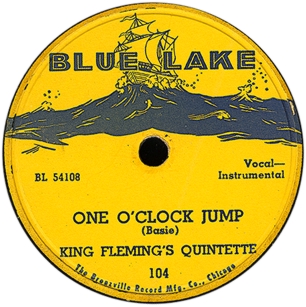
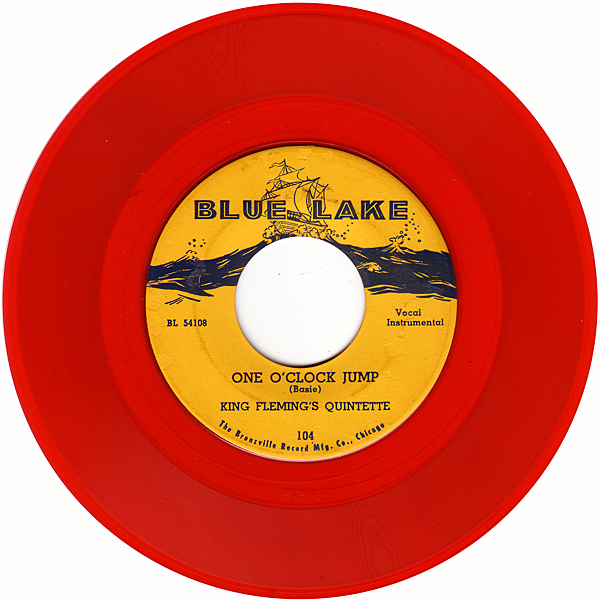
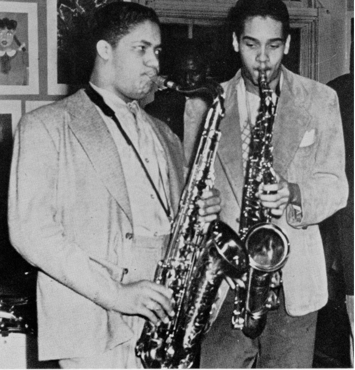
Since we haven't devoted a separate page to John Neely, we'll say a little more about him here. Neely was born in Chicago on January 29, 1930. After leaving King Fleming's group, he gigged with various leaders in Chicago. In the late 1950s, he worked with Bronzeville's top society band, which was led by Morris Ellis. A photo in the Defender showed Ellis and Neely at a formal dance.
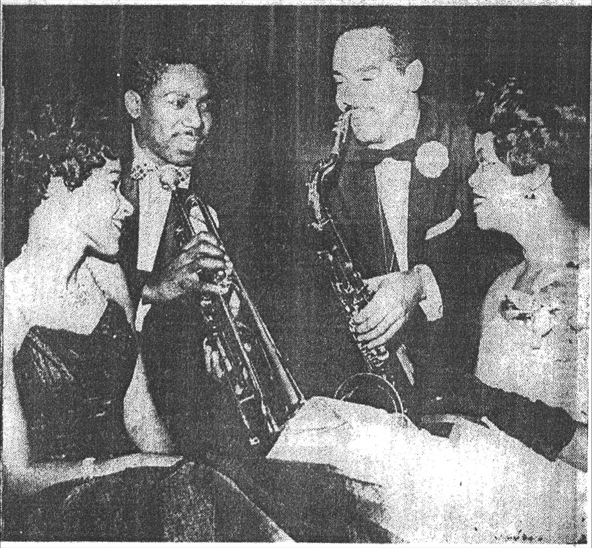
In 1960, John Neely made at least one side in Chicago for the Formal label, under the leadership of pianist Earl Washington: other band members were Johnny Avant (trombone), Herbert Brown (bass), and Walter Perkins (drums). He also appeared on a Billy Emerson session from March 24, 1960, which was first released on Mad and later on Emerson's own Tarpon label.
Later that same year, Neely joined the Lionel Hampton band. Down Beat (February 2, 1961) claimed that "John Neely, 30 year old Chicagoan, is being hailed by his fellows as 'one of the baddest acts in the country and the next BIG man on tenor.'" At the time, Neely's functions in Hamp's aggregation were tenor soloist—occasionally tenor duelist (with Andy McGhee)—and arranger, in a style that was quite "modern" for that band. According to the late Otto Flückiger, Neely is on Hamp at the Metropole and other recordings from 1960-1961, though it is not known at present whether any solos are preserved. Neely can also be seen and heard with the Hampton Orchestra in the film America di Notte, which was made in Italy in 1960 or 1961.
We have very few data points from Neely's career after he returned home from the Hampton tour. We happen to know of one gig from 1975, because George Lewis mentioned it in a footnote to his massive volume on the AACM, A Power Stronger than Itself. Lewis describes a concert that Neely produced on the near North Side, featuring "sprightly bebop-based music." On the occasion, Neely was working with Billy Brimfield (trumpet), George Lewis (trombone), a pianist Lewis couldn't remember, Thomas "Tiaz" Palmer (bass), and Steve McCall (drums). At a gig featuring three members of the AACM, it was no great shock that Richard Abrams dropped by during intermission—but then, "as we were all talking, Sun Ra came in, dressed as those who were familiar with him might expect" (p. 553 n. 147). By the late 1980s Neely must have been seriously ill or disabled, because the March 9, 1988 Chicago Tribune noted a benefit concert for him at Andy's (11 East Hubbard Street); participants included Von Freeman, Eddie Johnson, guitarist George Freeman, pianist John Young, and others. John Neely died on October 8, 1994 in Richton Park, Illinois. (Our thanks to Eric LeBlanc for finding John Neely's dates.)
King Fleming next surfaces at the Pershing Lounge; he signed an indefinite contract that Local 208 accepted and filed on March 18, 1954. On May 2, he opened at Harry's Show Lounge (the contract was posted on April 15). A private recording has been discovered; it appears to come from the Pershing.
King Fleming (p); others unidentified.
Live recording, probably Pershing Lounge, Chicago, April 30, 1954
| unidentified titles | private recording |
Another binaural recording from the Love archives. This one consists of a single reel of tape—no more than 30 minutes of music. The Love archives do not specify the location, but Fleming was yet to open at Harry's when the tape was made.
King Fleming's first engagement at Harry's was greeted with a blurb in the Defender:
To give the patrons something new and something different at all times Harry's Show Lounge 432 E. 63rd st will present one of the greatest entertaining bands ever to appear in a nite spot, King Fleming and his band Four Men and a Girl who are really tops. They open Monday May 2 for a limited engagement before starting on a nation wide theatre tour. (King Fleming's Band for Harry's Hot Spot, May 1, 1954, p. 14)
The Four Men and a Girl lineup was presumably the same one that we hear on the Blue Lake session: John Neely (tenor sax), Russell Williams (bass), Aubrie Jones (drums), and Lorez Alexandria (vocals).
King Fleming filed another contract with Harry's on July 15, 1954. Around the end of the month, he moved to the Strand Lounge (contract for 3 weeks filed on August 5). He moved his group to the Brown Derby, then took a 2-month engagement at the Normand Lounge (both contracts posted October 7, 1954).
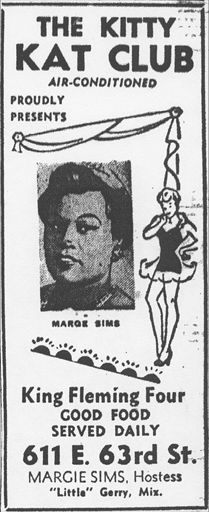
Early in 1955 King Fleming went to work at the Kitty Kat Club. The King Fleming Four was first advertised there on January 29, replacing a combo led by Tommy Mason. Our best guess is that the Four consisted of Fleming, Russell Williams, and Aubrie Jones with Ethel Duncan as the female vocalist (if Lorez Alexandria started the year with the group, Ethel Duncan had definitely replaced her by early fall). The group's run attracted a notice in Cash Box, which didn't give a lot of ink to artists without a recording contract: "playing to a full house" (June 18, 1955, p. 31). The group was held over for months at the Kitty Kat; the Chicago Defender of July 16, 1955 still had the King Fleming Four working Monday, Tuesday, and Wednesday nights at the club. This put Fleming in pretty good company; Robert "Prince" Cooper's trio had preceded Fleming at the venue, and Ahmad Jamal and John Young's trios would hold sway after he left. Vernel Fournier, who worked with Fleming on Lorez Alexandria's King albums (see below) said that the singer regularly appeared with Fleming at the club.
The Kitty Kat, which opened in early 1953 at 611 East 63rd, was a favorite venue for Sonny Stitt and other more art-oriented jazz musicians. It was not a big place; nothing bigger than a quartet was featured. According to drummer Charles Walton, quoted in Robert Pruter's book Doowop: The Chicago Scene, "The Kitty Kat was a gay bar; it was predominately gays there. But everyone went there. When it was prominent, some scenes from Raisin in the Sun were filmed there." McKie Fitzhugh, Fleming's sponsor back in the days of the Beau Brummells Club and now a prominent DJ, broadcast live from the Kitty Kat for a time.
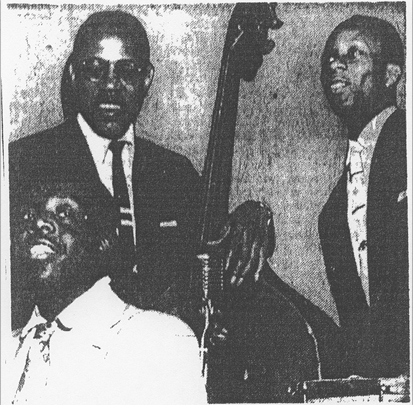
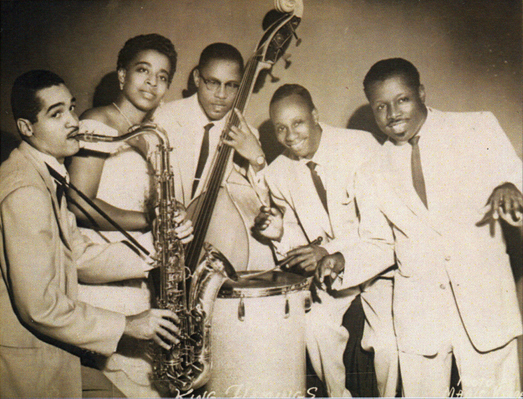
A photo that was probably made in 1955 shows a King Fleming quintet with Russell Wilson, Aubrie Jones, Ethel Duncan, and John Neely on tenor sax. How many gigs they played as a quintet, we don't know; the publicity we've found is all for the quartet lineup.
On July 7, Fleming posted another indefinite contract with Harry's Show Lounge; by August 13, Ahmad Jamal had replaced him at the Kitty Kat. But this would be his last stand at Harry's.
On October 6, 1955, Fleming posted an indefinite contract with the new Downbeat Room. The new club, at 624 South Michigan Avenue, appears to have had a delayed opening. But it started up November 11, with the King Fleming Four and Lee Barnes (Chicago Tribune, October 30, 1955, pt. 7 sec. 2 p. 8; "King Fleming, Lee Barnes at Downbeat," Chicago Defender, November 19, 1955, p. 6). Fleming was still at the Downbeat on December 17 ("What the Cats Do while the Squares Sleep," Chicago Defender, December 17, 1955, p. 6). Claude Jones took over shortly after that. By the end of his run at the Downbeat, probably already at the beginning, Ethel Duncan was the female vocalist in Fleming's combo; meanwhile, as per the Defender on December 17, Lorez Alexandria was working the Kitty Kat with John Young's trio.
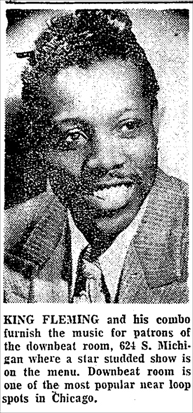
Just before his run at the Downbeat, Fleming was able to pick up another recording opportunity, this time for Chess. In this case, we have been able to locate King Fleming's actual demo disk, so we know for sure that Leonard Chess paid to rerecord the numbers in the studio.
King Fleming (p, voc); Ethel Duncan (voc); prob. John Neely (ts on -1); Russell Williams (b, voc); Aubrie Jones (d, voc).
unidentified location, Chicago, c. September 1955
| You're Gone (Fleming) -1 | unissued demo | ||
| Please Come Back (Fleming) | — |
Apparently one of the record companies that King Fleming was trying to interest in his group was Club 51, because an Audiodisc lacquer, with penciled indications on one side ("You've [sic] Gone" and "King Fleming Combo"), ended up in the possession of Jimmie Davis. The balance on the sides is a little rugged, vocals dominate, drums are recessed, and "You're Gone" ends with a cut-off bit of chatter, but the sonics are better than we would expect from Davis's back room. Davis passed on the group; Leonard Chess decided to sign them.
"You're Gone" (a phrase repeated several times in the song, so we know it's the correct title) is a droopy ballad on which a female singer, who is not Lorez Alexandria, and King Fleming alternate leads. "Please Come Back" has a bouncy vocal bass line and a lead by the same female vocalist, who we are reasonably sure is Ethel Duncan.
It's hard to replace members in a vocal/instrumental group, as the Dozier Boys could attest, so we'll assume, unless there is clear evidence to the contrary, that Russell Williams and Aubrie Jones continued to contribute to Fleming's vocal group records. The tenor saxophonist appears only on "You're Gone."
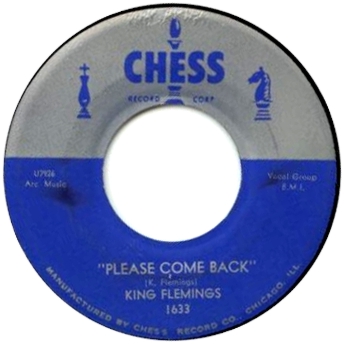
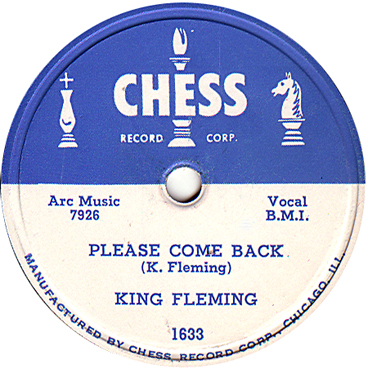
The Strollers (vocal group) -1; Ethel Duncan (voc *) and unidentified (female voc *); King Fleming (p, voc on *); Cliff Davis (ts); unidentified (bars -1); unidentified (eg -1); Russell Williams (b, voc on *); prob. Vernel Fournier (d).
Universal Recording, Chicago, c. October 1955
| 7923 | False Love [voc S] -1 | Power Vine CD 7093 | |
| 7924 | Baby Sweets [voc S] -2 | Power Vine CD 7093 | |
| U7925 | You're Gone (Fleming)* | unissued | |
| U7926 | Please Come Back (Fleming)* | Chess 1633 |
Lord lists this session (7925 and 7926 only) but gives an incorrect date. The approximate date was estimated by interpolation in Michel Ruppli's Chess Discography. We added the tracks by The Strollers because they immediately precede the two known Fleming tracks, The Strollers (whose personnel remains unidentified) needed accompaniment, and King Fleming was used to accompanying group vocals.
The label to "Please Come Back" notes the presence of a vocal group. "Please Come Back" (to Me) is an R&B number; the singers are two women and two men in a tightly arranged ensemble. The tenor saxophonist is highly prominent throughout, and there is no baritone sax. We haven't heard "You're Gone," which we hope is still extant, but from the evidence of the demo we are quite sure that the same vocal forces were involved.
Chess 1633 was a 78 and 45-rpm single released in 1956. It is quite rare but a 45 has turned up in the collection of Dr. Robert Stallworth and a 78 is now in the collection of Armin Büttner. The sides by The Strollers were never issued on Chess at all. Power Vine CD 7093, More Windy City Harmonizers: Unreleased & Rare Chicago R&B Vocal Groups-The Second Round is a bootleg CD, purportedly from Indonesia, and released in 1999. It consists of material by the more obscure doo-wop groups who recorded for Chess, most of it previously unreleased.
We have identified Cliff Davis (note the solo on "Baby Sweets") and Vernel Fournier by ear from 7923 and 7924. The drummer on 7926 also sounds like Fournier; the tenor saxophonist is not so rough in tone, but we'll assume it was Cliff Davis in more of a jazz mode.
The next two matrix numbers in the Chess series are by the doowop group The Five Notes: 7927, "Park Your Love" and 7928, "Show Me the Way." The Five Notes sides were released on Chess 1614. The musicians on this session have not been identified, but appear to be a different group.
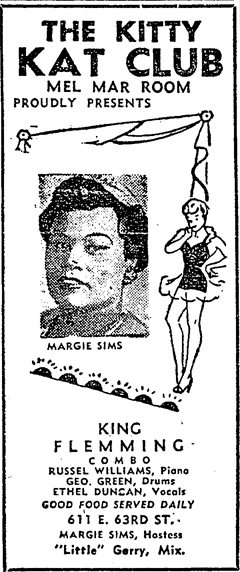
King Fleming posted another contract with the Kitty Kat Club on February 2, 1956. For Easter, Marge Sims, the Kitty Kat's owner, promised "a host of guest stars" (Rob Roy, "Cafes' Easter Starts Friday, Scribe Learns," Chicago Defender, March 29, 1956, p. 19). Around this time, George Green temporarily replaced Aubrie Jones in the quartet. The Kitty Kat virtually never posted the personnel of the groups it featured, but Green cops a mention in the club's ad from March 29 (which assigns Russell Williams to the wrong instrument).
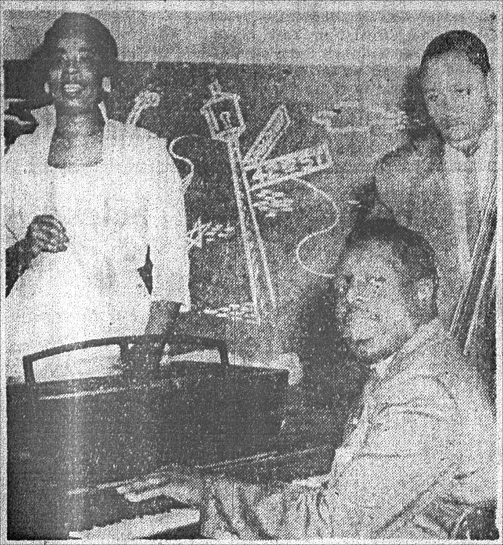
Around the end of April Fleming took a gig at the Sutherland Hotel Lounge (the contract was posted on May 3, and he was identified as Walter "King" Fleming). At the Sutherland, he led a quartet that initially featured singer Ethel Duncan (when the Sutherland ran a photo of this group, the drummer was not visible, so we don't know exactly when Aubrie Jones returned). By early July, Ethel Duncan had been replaced by Lorez Alexandria; a photo published on July 9 showed her with Fleming, while the caption noted that she had "taken over vocalist chores" (Chicago Defender, p. 18).
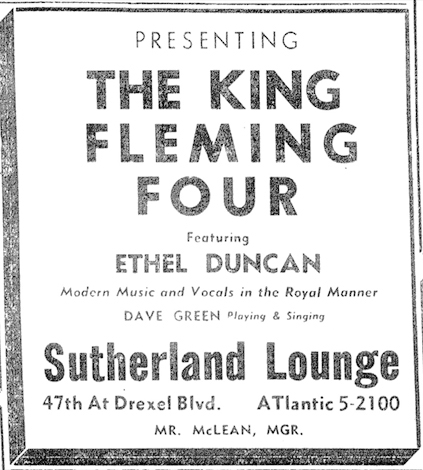
We previously thought that King Fleming appeared on a session for Vee-Jay (matrix numbers 56-458 through 56-461, mid-May 1956) with Sonny Til and the Orioles. A photo of the session in the Scotty Piper collection includes a pianist who looks somewhat like him. However, Albert "Diz" Russell, who sang baritone for the Orioles, had seen the photo and identified the pianist as Paul Griffin, who worked and toured with the group. Our thanks to Marv Goldberg for checking this point and correcting our error. See the Al Smith page for details concerning this session.
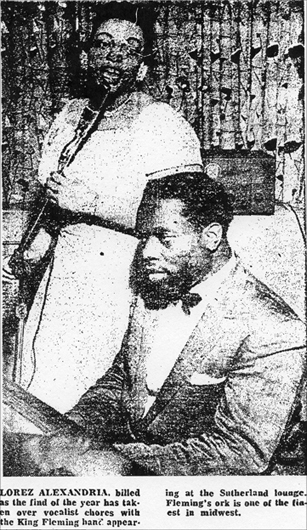
What led to Lorez Alexandria's decision to return to the combo, we don't know. But it immediately boosted King Fleming's publicity, from which we learn that Aubrie Jones was also back in the quartet. Fleming got a rare profile in the Chicago Defender. Despite the totally inane period headline ("King Fleming Ork Sets Pace with Unique Sock"), Al Duckett's article (July 10, 1956, p. 19) worked in an unusual amount of substance. Duckett gave Fleming's age as 32 (Fleming was 34 by then) and indicated how "King is his middle name—won't tell his first." He claimed "Please Come Back to Me" as a "current hit" (it actually hadn't been released yet, and probably hadn't been recorded in the studio, either), and misattributed the label as Blue Lake. But in a revealing remark about the make-up of the combo, Duckett called attention to "Aubrey [sic] Jones, a deep throated baritone, who doubles on drums; Lorez Alexandria, vocalist superb and Russell Williams, the bassist who also has a way with a tune." He also gave a pretty sharp sketch of King Fleming's preferences in music:
Fleming's favorite singer is Frank Sinatra, so believes a musician should be versatile enough to do almost anything, or any type of song—as Sinatra does.
His favorite band is the old Glenn Miller aggregation, so Fleming goes for new sounds, harmony and experimentation—as Miller did.
Couple these two ideas in music with the influence of Art Tatum, whom he considers the greatest and Teddy Wilson, whose rippling style he favors and you have an entertainer deluxe in Mr. Fleming.
As Duckett may have actually known, Fleming had been invited back by the Chess brothers. The next session looks intriguing, as it features King Fleming's compositions and (on the one track that was released) great tenor sax work by John Neely. But apparently the Chess brothers just couldn't see a market for this kind of material on singles.
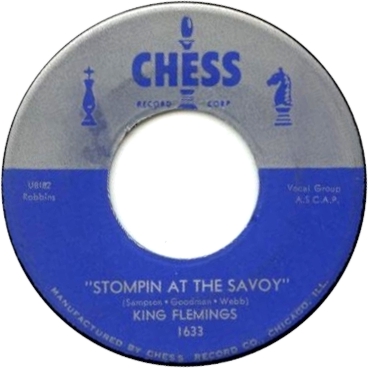
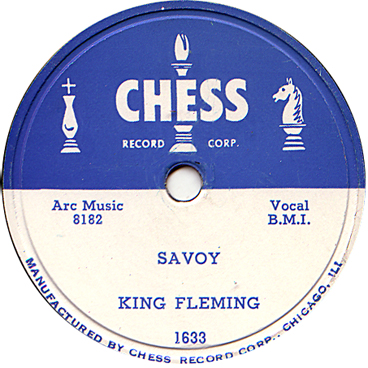
King Fleming (voc -1, p); John Neely (ts); vocal group: Lorez Alexandria (lead voc -1); Russell Williams (voc -1, b); Aubrie Jones (voc -1, d).
Universal Recording, Chicago, late July 1956
| U8179 | Time Out (Fleming) | unissued | |
| U8180 | Story of a Starry Night | unissued | |
| U8181 | One Stop Below | unissued | |
| U8182 | Stompin at the Savoy [Savoy] (Sampson-Goodman-Webb) -1 | Chess 1633 |
The session is mentioned in Lord but he is way off on the date, which he gives as March 1954 (that would make sense if it had really been done for Blue Lake, as implied by the confused reference in Duckett's article). Our dating is based on interpolation in Michel Ruppli's Chess Discography; the session immediately preceding this one in the U7000 series was cut by Howlin' Wolf on July 19, 1956. Lord truncates the title of U8182 to "Savoy" (as on the 78 but not the 45). Chess 1633 was a 78 and 45-rpm single released during the second half of 1956. By all accounts, it is very rare, but we are fortunate to be able to rely on a copy of the 45 in Dr. Robert Stallworth's collection and a copy of the 78 in Armin Büttner's.
A listen to "Stompin" shows us a jazz number performed in a similar spirit to "One O'Clock Jump" from the Blue Lake session; King Fleming even does his Count Basie impression at the keyboard. Since the lead work sounds like Lorez Alexandria's, she had recently rejoined his combo, and she was not yet signed to a label, we have no doubt that she participated in this session. The prominent tenor sax part, amounting to a solo line all the way through the piece, can be securely added to John Neely's limited representation on disk. The well-recorded bassist, and the drummer, who stays with brushes throughout, sound like Fleming's regulars, Russell Williams and Aubrie Jones.
We of course have no way to know whether the other tracks featured group vocals, but we suspect they did.
King Fleming's association with pianist, composer, and arranger Muhal Richard Abrams dates from this period. Born in Chicago on September 19, 1930, Richard Abrams was the second of nine children. He attended Forrestville school, then was sent for a time to Moseley, a reform school near 16th Street and Michigan Avenue. At DuSable High School, he knew many of the musicians who took Capt. Walter Dyett's band classes, but was more interested in sports at the time. Then, in 1946, Abrams dropped out of DuSable, first taking private piano lessons and then enrolling at the Metropolitan School of Music while working a day job at a printing company. Gaining experience on a wide variety of gigs, from stage shows to church socials, Abrams left the Metropolitan School, after the keybard harmony instructor asked him to show "a friend" the correct changes to "April in Paris." By the mid-1950s, he was a regular participant in the jam sessions held at the Cotton Club. (See George E. Lewis, A Power Stronger than Itself: The AACM and American Experimental Music, Chicago: University of Chicago Press, 2008, pp. 5, 6, 8, 11-13, 14, 17-18).
Abrams first shows up on the Local 208 contract list on April 21, 1955, when his indefinite contract with El Mambo Lounge was accepted and filed. That same year, Abrams recalled, he was introduced to Fleming by Will Jackson, a trumpet player and composer who had played with Jimmy Lunceford; Jackson had been giving Abrams informal lessons in arranging. Abrams told George Lewis that at this time he still had a lot of learning ahead of him. With King Fleming's big band, "Every so often they would let me sit in at the piano, until I would make a mistake and they would tell me to get up. But they would put me back down there until I was ready to do it" (A Power Stronger than Itself, p. 58; Lewis interviewed Abrams on multiple occasions).
Note the joint composition on Fleming's next session for Chess (which, unfortunately, remains unissued and barely documented).
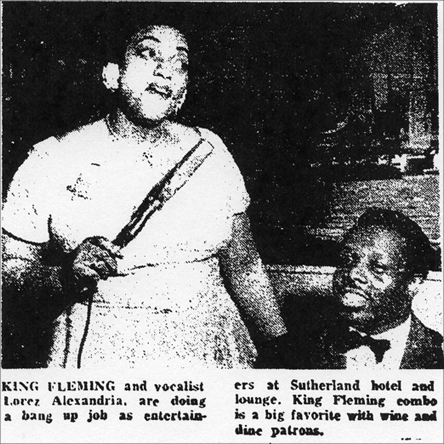
King Fleming's combo with Lorez Alexandria was still at the Sutherland in August. On August 11, his quartet played the Defender's annual Bud Billiken picnic, on the same bill as The El Dorados, Byllye "Jet" Williams, dancer Yvonne Maury from the Club DeLisa's show, and Floyd Campbell's Orchestra (Al Monroe, "So They Say," Chicago Defender, August 14, 1956. p. 15). In October 1956, Fleming landed a week at the Brass Rail in the Loop (contract posted on October 4, 1956). Late the same month, he picked up more work at the Sutherland (indefinite contract accepted and filed on November 1). His combo was still there, still featuring Lorez Alexandria, in February 1957.
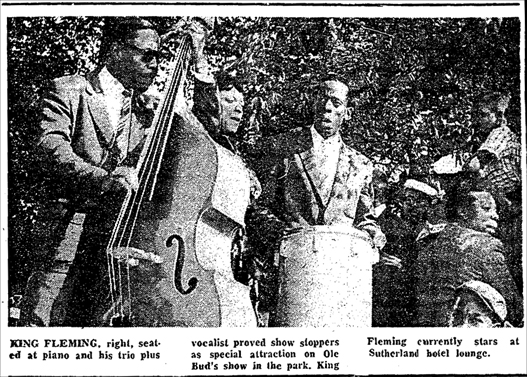
King Fleming (p); others unidentified.
Universal Recording, Chicago, c. January 1957
| 8422 | Dancers | Chess (unissued) | |
| 8423 | Don't Worry about Me | unissued | |
| 8424 | Lonely Darling | unissued | |
| 8425 | The Big Lie | unissued | |
| 8426 | Great Life (Fleming-Abrams) | unissued | |
| 8427 | Unfaithful | unissued |
Our information comes from Lord, who does not venture an opinion as to studio or date. Since 8393 was "Got My Mojo Workin'," by Muddy Waters, recorded December 1, 1956, the recording date has to be after that. The surviving dating for sessions from January and February 1957 is pretty sparse, but 8422 through 8427 fit January. Chess Studios started recording in late June or early July 1957. Jack Wiener, the engineer, told Cash Box on June 1, 1957 (p. 44) that the new studios at 2120 South Michigan Avenue, just completed, would be known as Sheldon (the name they would use for outside work). On June 8, Cash Box noted that everyone who could get in was angling for a tour of the new facilities, including the studios. Actual sessions had to wait a little longer. So the session wasn't made there.
In light of the vocal ensemble work on the previous session, we of course suspect that there might be some here as well.
Enough sides were cut at this session that one wonders whether an LP was once planned. If so, it was abandoned. Maybe the reuse of "Great Life" on the first MJT+3 LP (see below) had something to do with this. The wholesale destruction of Chess masters in the Universal Studio fire of 2008 probably means that all of this material is now lost.
"Great Life" was part of a significant collaboration between King Fleming and Muhal Richard Abrams.
Abrams was keeping a low profile at the time, taking no gigs as a leader that we have been able to trace. His first studio recording would be Argo LP 621, titled simply MJT+3. This was the first and most obscure LP by the jazz quintet that was anchored by the Modern Jazz Two, bassist Bob Cranshaw and drummer Walter Perkins; the group was originally assembled by jazz DJ Daddy-O Daylie. On the LP, which it appears was recorded in August 1957 before the MJT+3 had actually taken any club gigs, Paul Serrano played trumpet, Nicky Hill played tenor sax, and Richard Abrams played piano, also contributing several compositions. For some reason, "Great Life" showed up on this LP as "No Name," credited to Abrams only (Lewis, p. 58, p. 539 n. 13).
When the band started an engagement at the Blue Note in the Loop, on September 4, 1957, George Coleman had replaced Nicky Hill (Chicago Defender, September 14, 1957, p. 18; a photo of this group can be seen in A Power Stronger than Itself, on the first of the unnumbered pages after p. 216). Abrams may still have been with the group when it was booked into the New Jazz Scene Lounge (Cash Box, December 28, 1957, p. 54; the engagement started December 24). He seems to have left the MJT+3 in 1958; he is not on any of the group's later recordings.
An article in the Chicago Reader (April 9, 1999, Section 3, p. 1) declares that out of all of his experiences as a working musician in Chicago, "More than anything, [Abrams'] experiences with pianist King Fleming's orchestra, to which he contributed some of his first professional arrangements, presaged the work he would do with his early 60s workshop group, the Experimental Band, and later with the AACM."
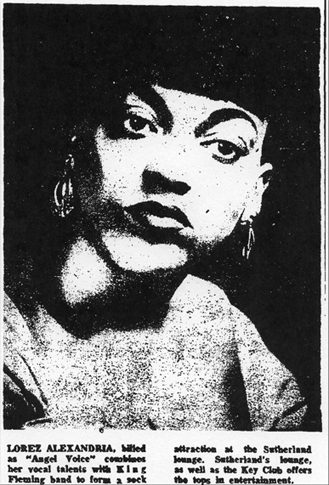
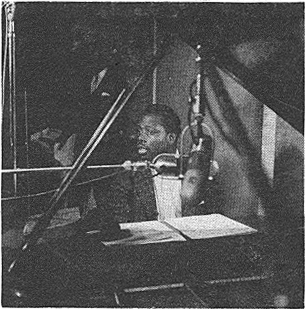
Lorez Alexandria's signing with King Records must have grown directly out of the Sutherland Lounge gig. She recorded her first LP in February 1957, with an augmented King Fleming band.
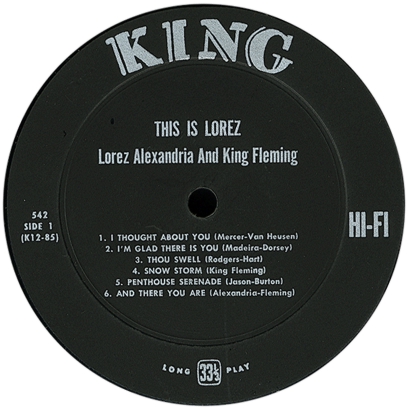
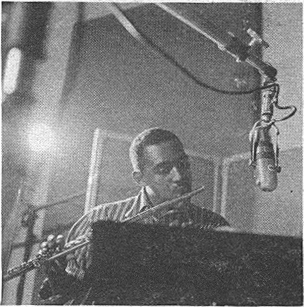
Lorez Alexandria (voc); Ronald Wilson (ob -1, fl); King Fleming (voc -3, p, arr); Wilbur Wynne (eg); Russell Williams (voc - 3, b); Vernel Fournier (d); Aubrie Jones (voc -3, bgo -2).
Chicago, February 25, 1957
| F547 | Penthouse Serenade (Jason-Burton) | King LP 542, BGP CDBGPD 174 | |
| F548 | And There You Are (Alexandria-Fleming) -3 | King LP 542, BGP CDBGPD 174 | |
| F549 | Thou Swell (Rodgers-Hart) [RW out] | King LP 542, BGP CDBGPD 174 | |
| F550 | Snow Storm (Fleming) | King LP 542, BGP CDBGPD 174 | |
| F551 | I'm Glad There Is You (Madeira-Dorsey) -1, 3 | King LP 542, BGP CDBGPD 174 | |
| F552 | Introduction / I Thought about You (Mercer-Van Heusen) -3 | King LP 542, BGP CDBGPD 174 |
Our session information comes from Lord (which in turn relied on Michel Ruppli's discography of the King label). The LP title can be found in Neal Umphred's Goldmine's Price Guide to Collectible Jazz Albums, 1949-1969 (2nd ed., 1994). The label credits the LP to "Lorez Alexandria and King Fleming." The studio band adds multi-reed player Ronald Wilson, guitarist Wilbur Wynne, and drummer Vernel Fournier to Fleming's regular band.
Umphred's guide says that the LP was released in 1958. In fact, it was out 3 months after King finished recording it. Cash Box reported, out of breath, on June 29, 1957: "Meanwhile over at King, Ralph Bass all excited over local dee-jay acceptance of King LP, 'This Is Lorez'—went thru 500 first week, says Bass" (p. 46)."
The liner notes to the original This Is Lorez LP indulge in the usual show-biz practice of shaving something off Lorez Alexandria's age, giving a birth date of August 14, 1930. She was born in Chicago, and her full name was Dolorez Alexandria Turner. A number of sources, including the New Grove Encyclopedia of Jazz, have given the year as 1929; others have said 1925. The King LP notes credit her with 8 years in church choirs and a cappella groups, and an appearance at Blair House for President Harry Truman.
The liner notes to the BGP CD, by Fred Dellar, admirably thorough in most respects, show no recognition of the operating procedure employed by King Fleming's quartets of the period. Dellar calls "Introduction/I Thought about You" an effort "to attention-grab by means of an ultra-gimmicky, if ultimately slightly embarrassing, use of a vocal group that presumably matriculated from Sweeney Todd's Academy For Barbershop Quartets." The singers weren't out of any barbershop; they were none other than Lorez Alexandria, King Fleming, Russell Wilson, and Aubrie Jones. Some other dapples of arranged vocal harmony pass unnoticed.
Dellar also misses the contributions by Ronald Wilson, a legendary musical nomad whose résumé would grow in time to encompass the Sun Ra Arkestra and the Johnny Otis Show. Since the oboe was probably his least-used axe, in an instrumentarium that also included piccolo, tenor saxophone, and baritone saxophone, one wonders why Wilson wasn't also asked to contribute on the tenor sax at least. Maybe because his tenor sound was out of Hawk and Fleming preferred the Lestorian mode?
Dellar does, however, pay close and perceptive attention to Alexandria's interpretation of each song.
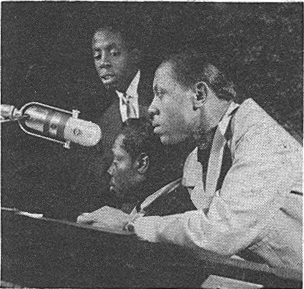
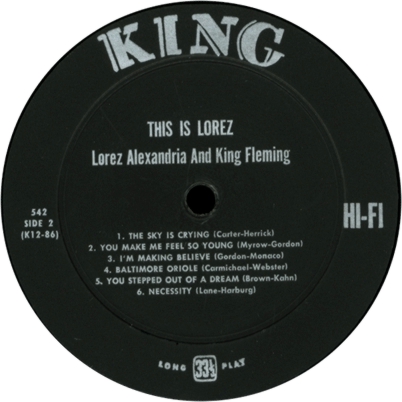
Same personnel.
Chicago, March 5, 1957
| F553 | You Stepped out of a Dream (Brown-Kahn) -3 | King LP 542, BGP CDBGPD 174 | |
| F554 | The Sky Is Crying (Carter-Herrick) -1 | King LP 542, BGP CDBGPD 174 | |
| F555 | You Made Me Feel So Young (Myrow-Gordon) [RW out] | King LP 542, BGP CDBGPD 174 | |
| F556 | I'm Making Believe (Gordon-Monaco) | King LP 542, BGP CDBGPD 174 | |
| F557 | Baltimore Oriole (Carmichael-Webster) -2 | King LP 542, BGP CDBGPD 174 | |
| F558 | Necessity (Lane-Harburg) [RW out] | King LP 542, BGP CDBGPD 174 |
King had the LP out in June 1957 (see above).
The notes to King LP542 mention "two of Chicago's top young photographers, Torrell Mason and Tom Tatum," who did a series of action shots from the session. Except for the cover photo of Lorez Alexandria (not in the best condition on our copy) the only published traces of this activity are the three indifferently reproduced photos of the musicians that appeared on the back of the original release. Do any of the original session photos survive?
Our session info on this LP comes from Ruppli via Lord. There may be a 1980s reissue of King 542 on the Sing label; to be researched. For release in Britain, the album was sectioned off into three Parlophone EPs (4 tracks each); we know the release number of only one of these.
Lorez Alexandria: This Is Lorez/Lorez Sings Pres is a 2-LPs-on-one-CD reissue on BGP, a subsidiary of Ace Records. BGP CDBGPD 174 was released in 2006. It was the first CD reissue of King LP 542, though not of King LP 565 (see below).
"Baltimore Oriole" was as close to a signature number as Lorez Alexandria ever had. She would make several more recordings of it.
On April 18, 1957 King Fleming posted another 4-week contract with the Sutherland Lounge. As "Walter" Fleming, he posted a contract with the Bar o' Music on June 6 (it ran for 2 weeks with options). In August he was back at the Sutherland (contract for "one week only" accepted and filed on August 15). On September 5, he posted a new indefinite contract with the Kitty Kat Lounge, as it was referred to on that occasion.
The next Lorez Alexandria LP still featured King Fleming, but did not use the other members of his band. Instead, an all-star studio sextet was assembled for the occasion.
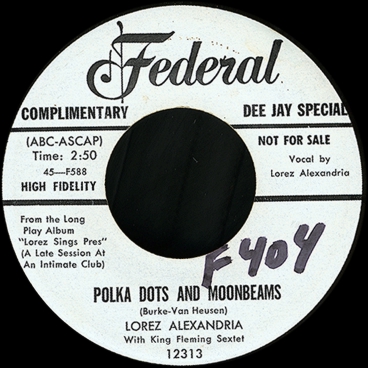

Lorez Alexandria (voc); Paul Serrano (tp); Cy Touff (btp); Charles Stepney (vib); King Fleming (p, arr); Eldee Young (b); Vernel Fournier (d).
Chicago, November 6, 1957
| F585 | There Will Never Be Another You (Dubin-Warren) | King LP 565, Sing LP 565, King KCD-565, BGP CDBGPD 174 | |
| F586 | Easy Living | King LP 565, Sing LP 565, King KCD-565, BGP CDBGPD 174 | |
| F587 | D. B. Blues (Young) | King LP 565, Sing LP 565, King KCD-565, BGP CDBGPD 174 | |
| F588-1 | Polka Dots and Moonbeams (Burke-Van Heusen) [PS and CT out] | King LP 565, Federal 12313, Sing LP 565, King KCD-565, BGP CDBGPD 174 |
The LP is said to have been taped at a club; if it was done where King Fleming was working, that was of course the Kitty Kat. But when applause is heard it is rather light, the tell-tale sound of a few invitees to the recording studio.
Our basic information comes from Lord (derived ultimately from Ruppli); both leave out the 45-rpm single on Federal 12313. Neal Umphred says that the LP was released in 1958. Thanks to Ken Ellzey for a dub of the LP, and a Xerox of the back liner. Although discographies list F589, "Jumpin' with Symphony Sid," with this session, Lorez Alexandria mentions Earl May on bass while singing on that piece—so it has been moved to the next session. Thanks to Dennis Whitling for pointing out the discrepancy.
From photos included in the BGP CD booklet, it looks as though King LP 565 was released with black labels that read "Federal" across the top. Dellar informs us that in Britain there was a 10-inch Parlophone LP release of Lorez Sings Pres in 1958. We need the release number—and we wonder whether all 10 tracks made it onto this issue.
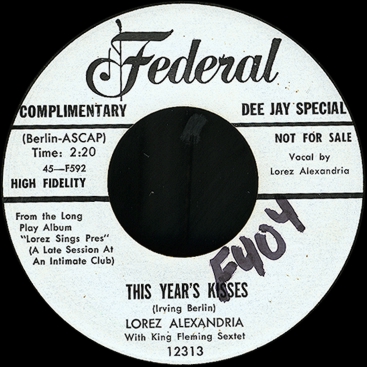
Same personnel, except Earl May (b) replaces Eldee Young. Unidentified male (announcement -1).
Chicago, November 13, 1957
| F589 | Jumpin' with Symphony Sid (Young) | King LP 565, Sing LP 565, King KCD-565, BGP CDBGPD 174 | |
| F590 | You're Driving Me Crazy | King LP 565, Sing LP 565, King KCD-565, BGP CDBGPD 174 | |
| F591 | Fooling Myself | King LP 565, Sing LP 565, King KCD-565, BGP CDBGPD 174 | |
| F592-1 | This Year's Kisses (Berlin) [PS and CT out] | King LP 565, Federal 12313, Sing LP 565, King KCD-565, BGP CDBGPD 174 | |
| F593 | Fine and Dandy -1 | King LP 565, Sing LP 565, King KCD-565, BGP CDBGPD 174 | |
| F594 | No Eyes Blues (Young) | King LP 565, Sing LP 565, King KCD-565, BGP CDBGPD 174 |
The basic information is from Lord. Lord, however, omits the 45-rpm release on Federal 12313, which was obviously coordinated with King LP 565 (the label copy on the 45 mentions that it was taken from the LP). Both F588 and F592 carry the suffix -1 in the trail-off vinyl to the single. Federal 12313 identifies the artists as "Lorez Alexandria with King Fleming Sextet."
The liners to King LP 565 and King KCD-565 incorrectly switch "No Eyes Blues" with "There Will Never Be Another You." "No Eyes Blues" is listed as the second tune on Side B when actually it's the fourth. And "Jumpin' with Symphony Sid" appears to come from this session instead of the preceding one.
Sing LP 565 was a straight reissue of King LP 565; it was released in 1988. The Sing label was a subsidiary of Official. King KCD-565 was released in 1987 and remains in print; it was part of a bare-bones CD reissue series. The front cover is reproduced in the CD leaflet, but the LP liner notes were left out.
Lorez Alexandria: This Is Lorez/Lorez Sings Pres is a 2-LPs-on-one-CD reissue on BGP, a subsidiary of Ace Records. BGP CDBGPD 174 was released in 2006.
On February 20, 1958, King Fleming posted another indefinite contract with the Kitty Kat. An entertainment roundup referred to "King Fleming with Lurlean Harris on vocals," so this was now the final version of his vocal/instrumental group. But the writer also described the Kitty Kat as "haven for young fans who like rock 'n roll," which has to make you wonder whether he'd ever stepped inside the place ("King Fleming, Ingram Also Rate with Fans," Chicago Defender, March 22, 1958, p. 18). On March 6, Fleming posted an indefinite contract with the Thunderbird Lounge (the engagements may have run concurrently, as we doubt that either was for the Local 208 mandated maximum of 5 days a week). Fleming was eventually replaced at the Kitty Kat by Andrew Hill, who posted a contract on September 18.
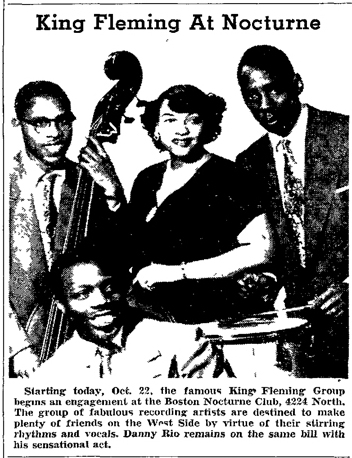
On October 2, Local 208 posted Fleming's indefinite contract with the Boston Nocturne Club, 4224 West North, which advertised him as "Direct from Vegas." His run at the Nocturne, well documented with display ads, started on October 22 and ended on November 30. The club ran the old photo of the band from 1953, even though Lorez Alexandria had spent part of 1958 with the Ramsey Lewis Trio at the Cloister Inn, 900 North Rush Street, and was almost certainly not on hand for this gig.
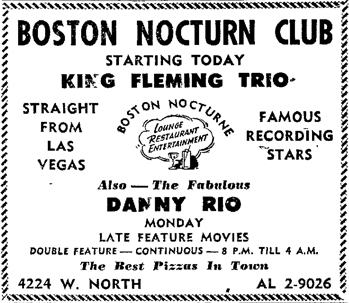
Next Fleming returned to the Kitty Kat; he had filed another indefinite contract on November 20, 1958. This residency at the Kitty Kat Club, probably still with Lurlean Harris, ended in June 1959; the last Defender ad to mention him there appeared in May, and on July 2 he posted a contract with Local 208 for 3 weeks at the Lake Meadows Lounge.
From the end of July 1959 through May 1960, Fleming dropped off the Local 208 list; he was either on the road or working non-Union venues (which were becoming more common by this time). King Fleming told Robert Campbell that he spent some time in New York City; a writeup from 1963 would proclaim that he had performed at the Baby Grand, most likely during this period. He also said that he made some recordings there behind singers (could be, but we have not traced these).
Meanwhile, Lorez Alexandria made a couple of marathon sessions for King in 1958-1959, generating no fewer than 26 tracks that were released on 2 LPs. One of the singles from these dates, King 5189, was reviewed in Cash Box on March 28, 1959 (p. 17). The dating of the sessions is not clear, but Ralph Bass, then an A&R man for King, was keeping Cash Box updated on Alexandria's club gigs in October 1958 (October 18, p. 44; she was set to headline an engagement at the Town Hill Jazz Club in Flatbush). The company variously used piano and rhythm; a mid-sized band of trumpets, trombones, and rhythm; and a big band with added strings. Some quality jazz soloing can be heard on the LPs, but the company didn't identify any of the musicians or the arrangers. In any event, King Fleming was not involved in these efforts.
Alexandria next signed with the Chess brothers' Argo label. In March 1960, she recorded an LP with Fleming's sometime rival, Ramsey Lewis, whose trio was augmented with several members of the Count Basie Orchestra. Around August or September 1960, she did a second LP with pop production, featuring a string section arranged and led by Riley Hampton. Her last two LPs for Argo, recorded in February 1962 and January 1963, featured pianist John Young and guitarist George Eskridge along with other top musicans from the Chicago scene. On the January 1963 session she was reunited with Ronald Wilson. A remake of "Baltimore Oriole," with Wilson on flute, was very similar in conception to the version from her first album; Wilson, however, did also get to play tenor sax on one number. While Fleming was signed to the same label during this period, he was apparently not asked to participate in any of these efforts. By the time her last Argo LP was recorded, Lorez Alexandria had gotten married and moved to Los Angeles, which would be her home for the rest of her life.
On May 19, 1960, the King Fleming Trio posted an indefinite contract with the Dondi Theater Lounge. On October 6, his contract for one month at Swing City was accepted and filed; it came with an option for another two weeks. Fleming finally caught a break, recording-wise: the Chess brothers signed him and recorded his trio during the waning days of the Dondi enagagement or the beginning of his gig at Swing City.
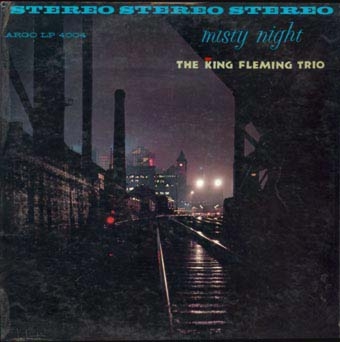
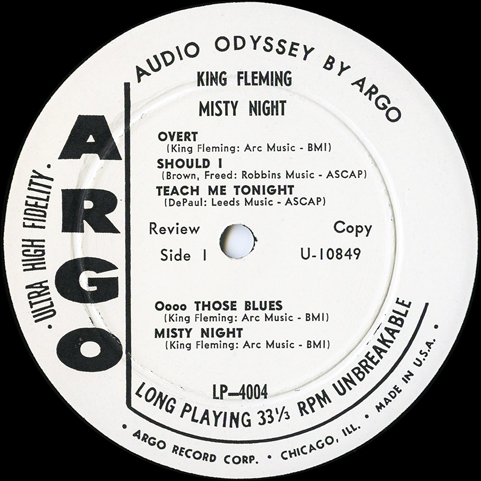
King Fleming (p); Rail Wilson (b); Royce Rowan (d); Aubrie Jones (bgo -1).
Chess Studios, Chicago, Fall 1960
| U-10849 | Overt (Fleming) | Argo LP-4004, Argo LPS-4004, MCA [J] MVCJ-19191, Fresh Sounds [Sp] FSR-CD 834 | |
| Should I? -1 (Brown-Freed) | Argo LP-4004, Argo LPS-4004, MCA [J] MVCJ-19191, Fresh Sounds [Sp] FSR-CD 834 | ||
| Teach Me Tonight (DePaul) | Argo LP-4004, Argo LPS-4004, MCA [J] MVCJ-19191, Fresh Sounds [Sp] FSR-CD 834 | ||
| Oooo, Those Blues (Fleming) | Argo LP-4004, Argo LPS-4004, MCA [J] MVCJ-19191, Fresh Sounds [Sp] FSR-CD 834 | ||
| Misty Night (Fleming) | Argo LP-4004, Argo LPS-4004, MCA [J] MVCJ-19191, Fresh Sounds [Sp] FSR-CD 834 | ||
| U-10850 | When Your Lover Has Gone (Swan) | Argo LP-4004, Argo LPS-4004, MCA [J] MVCJ-19191, Fresh Sounds FSR-CD 834 | |
| Walk Softly -1 (Fleming) | Argo LP-4004, Argo LPS-4004, MCA [J] MVCJ-19191, Fresh Sounds [Sp] FSR-CD 834 | ||
| Moonlight in Vermont (Suessdorf-Blackburn-Goldsen) | Argo LP-4004, Argo LPS-4004, MCA [J] MVCJ-19191, FFresh Sounds [Sp] FSR-CD 834 | ||
| Loveliness of You -1 (Fleming) | Argo LP-4004, Argo LPS-4004, MCA [J] MVCJ-19191, Fresh Sounds [Sp] FSR-CD 834 | ||
| Imported Blues (Fleming) | Argo LP-4004, Argo LPS-4004, MCA [J] MVCJ-19191, Fresh Sounds [Sp] FSR-CD 834 |
Our information comes from copies of the LP in the collections of Armin Büttner and Robert Campbell. Lord leaves out "Overt" and lists "Misty Night" as the first track. And he renders another title as "Ooo Those Blues." When we supply matrix numbers for the Argo/Cadet LPs, they belong to Side A and Side B. And we list tracks in the order they appeared on the LPs, which is most likely not the order in which they were recorded. Argo LP/LPS-4004, in mono and stereo editions as was then customary, was released in May 1961 (a DJ copy in the collection of Robert L. Campbell has 5-25-61 written on the back cover, and the LP got one line in the Oakland Tribune in June: "Misty Night: pleasant, moody background music by pianist King Fleming's combo"; see Russ Wilson, "Needle Talk: Memorable Sound Heard Anew," Oakland Tribune, June 11, 1961, p. 6-M).
There is a Japan-only reissue of Misty Night on CD, MCA MVCJ-19191; this was released in June 1999. For some reason, the Japanese CD is in mono. Shortly after King Fleming's death, Fresh Sounds reissued all three of his Argo/Cadet LPs on a 2-CD set titled The King Fleming Trio (Fresh Sounds FSR-CD 834); here all of the selections from Misty Night are in stereo.
This is as good a place as any to give a little credit to Robert L. "Rail" Wilson. Rail Wilson was born in Macon, Georgia, probably in 1919. His family moved to Chicago, where attended DuSable High School and trained under Captain Walter Dyett. He was active on the scene after World War II, performing with Dinah Washington and Ben Webster. When Marl Young launched the Sunbeam label, in 1946, Rail Wilson was his regular bassist, appearing on 5 of the sessions made for the company. In October 1946, Wilson and drummer Oliver Coleman were also part of Dorothy Donegan's trio (see our Red Saunders page) when she recorded for Continental. Later on, in addition to the King Fleming session, he recorded with 1920s-style pianist Art Hodes. Rail Wilson died at Ingalls Memorial Hospital in Harvey, Illinois, on December 6, 1978. He was 59 years old ("Chicago jazz musician Robert L. Wilson dies," Chicago Tribune, December 7, 1978, p. 67).
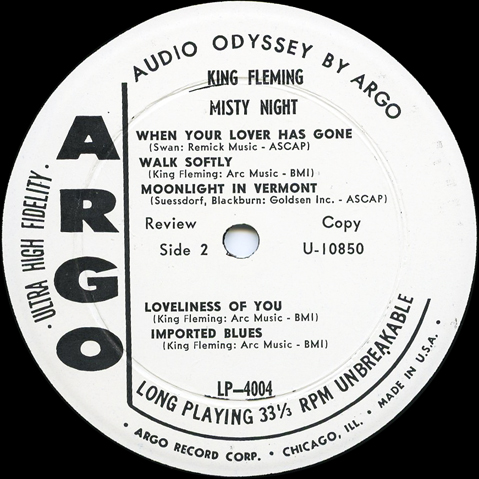
King Fleming may have exited Swing City around the end of October; in any event, Jump Jackson's group was brought in, posting a 2-week contract on November 3, 1960. After a long absence from the Kitty Cat Club, King Fleming returned to his old home base around New Year's Day 1961; he posted a contract for 8 weeks on January 5. Toward the end of February, he moved to Danny's Hideaway for a long stay (contract for 3 months accepted and filed on February 16; an extension for another 8 weeks posted on April 20). On March 12, 1961, the Chicago Tribune (pt. 5, p. 11) said "the King Fleming Trio and Aubrie Jones, vocalist" were about to open at the Hideaway. (It wasn't a bad week for jazz piano in Chicago: King Fleming started on Tuesday, Thelonious Monk and Bill Evans were both opening on Wednesday, and Ahmad Jamal was slated for a big jazz concert on Saturday). Perhaps after some time on the road, Fleming returned to the Kitty Kat once again (indefinite contract filed October 19, 1961). On March 15, 1962, Fleming posted an indefinite contract with the Prime Steak House, while Dave Green posted a contract for a week at the Kitty Kat. Fleming's next LP was recorded around the time that he started his new gig.
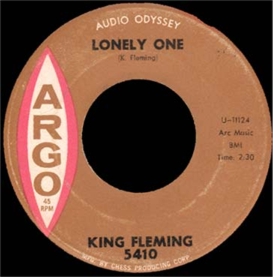
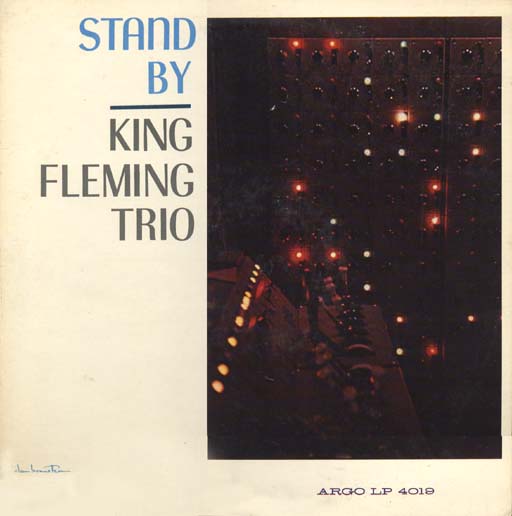
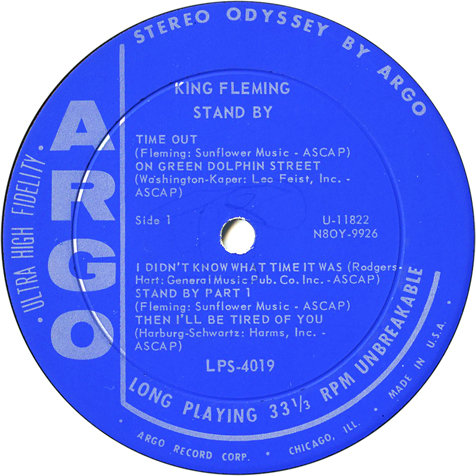
King Fleming (p); Malachi Favors (b); Royce Rowan (d); Charles Stepney (vib -1); three or four unidentified males (voc, African perc -2).
Chess Studios, Chicago, March 2 and 9, 1962
| U-11822 N8OY-9226-1 |
Time Out (Fleming) -1 | Argo LP-4019, Argo LPS-4019, Argo [J] UCCC-9080, Fresh Sounds [Sp] FSR-CD 834 | |
| On Green Dolphin Street (Washington-Kaper) | Argo LP-4019, Argo LPS-4019, Argo [J] UCCC-9080, Fresh Sounds [Sp] FSR-CD 834 | ||
| I Didn't Know What Time It Was (Rodgers-Hart) | Argo LP-4019, Argo LPS-4019, Argo [J] UCCC-9080, Fresh Sounds [Sp] FSR-CD 834 | ||
| Stand By Part 1 (Fleming) | Argo LP-4019, Argo LPS-4019, Argo [J] UCCC-9080, Fresh Sounds [Sp] FSR-CD 834 | ||
| Then I'll Be Tired of You (Harburg-Schwartz) | Argo LP-4019, Argo LPS-4019, Argo [J] UCCC-9080, Fresh Sounds [Sp] FSR-CD 834 | ||
| U-11823 N8OY-9227-1 |
Junction City Blues (Fleming) | Argo LP-4019, Argo LPS-4019, Argo [J] UCCC-9080,Fresh Sounds [Sp] FSR-CD 834 | |
| Song of Paradise (Fleming) -1 | Argo LP-4019, Argo LPS-4019, Argo [J] UCCC-9080, Fresh Sounds [Sp] FSR-CD 834 | ||
| Stand By Part 2 (Fleming) -2 | Argo LP-4019, Argo LPS-4019, Argo [J] UCCC-9080, Fresh Sounds [Sp] FSR-CD 834 | ||
| U-11124 | Lonely One (Fleming) | Argo 5410, Argo LP-4019, Argo LPS-4019, Argo [J] UCCC-9080, Fresh Sounds [Sp] FSR-CD 834 | |
| Gypsy in My Soul (Clay-Moe) | Argo LP-4019, Argo LPS-4019, Argo [J] UCCC-9080, Fresh Sounds [Sp] FSR-CD 834 | ||
| U-11125 | Between the Toes (Fleming) | Argo 5410, Argo LP-4019, Argo LPS-4019, Argo [J] UCCC-9080, Fresh Sounds [Sp] FSR-CD 834 |
Argo LP4019 was released in 1962. We are not sure of the month, but the LP was reviewed by Chuck Ober in the St. Petersburg Times on December 31, 1962 (p. 6-B). The LP was mastered and pressed by RCA Victor, as can be seen from the N-series code. We infer from the matrix numbers that Argo 5410, a 45-rpm single, came out before the album. Charles Stepney, who plays vibes on two tracks, was identified by King Fleming when interviewed by Robert Campbell. Three or four male voices can be heard chanting African style on Part 2 of "Stand By," where it appears that King Fleming and Malachi Favors switch to percussion (no piano can be heard for 2 minutes during the piece). We wonder whether Charles Stepney might also have helped out here. King Fleming shouts "Between the Toes!" on the last item.
Stand By was reissued in February 2004 on a Japanese CD, Argo UCCC-9080, and in Spain in 2014 as part of a 2-CD set, The King Fleming Trio on Fresh Sounds FSR-CD 834.
Stand By is a meticulously programmed LP that includes jazz arrangements of standards, blues, New Orleans R&B, and even (in "Stand By Part 2"), elements of West African music. Muhal Richard Abrams told Gene Santoro, "Look at all the different themes [Fleming] used on Stand By. In Chicago, most musicians were like that. That's why you could have an AACM and a Sun Ra come out of there" (from Santoro's book Dancing in Your Head). In fact, Malachi Favors (1927-2004) was the bassist in Fleming's trio at the time, and this LP is one of the last recordings he participated in before he became a mainstay of the AACM.
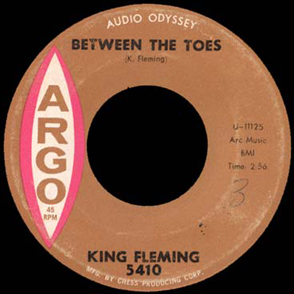
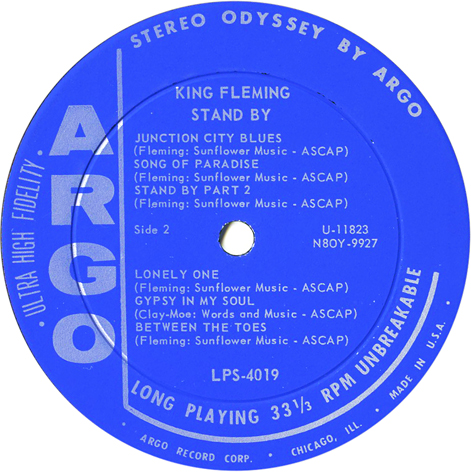
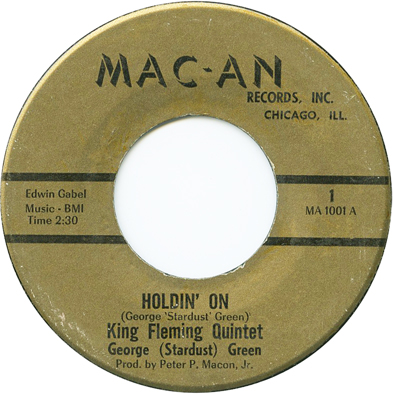
In late 1962 or early 1963, a King Fleming group accompanied George Green on a session for the highly obscure Mac-An label, which was owned by one Peter P. Macon Jr. So far as we know, Mac-An was responsible for just one 45-rpm single, but released it twice, with different labels, label copy, and release numbers.
Green already knew Fleming well, having worked in his trio in 1952. He had also performed with society bandleader Moris Ellis. In 1956, the first edition of his Amazing Trio had Eldee Young on bass and Ramsey Lewis on piano—before Lewis went out as a leader and picked up Redd Holt.
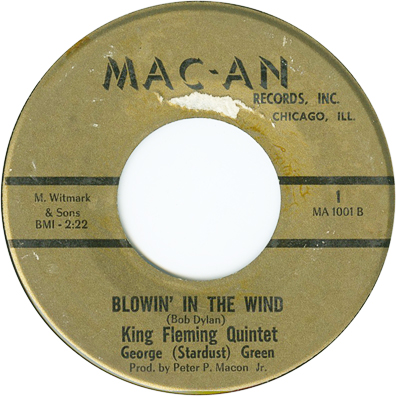
George Green (voc); acc. by King Fleming (p, arr, ldr); unidentified (ts); unidentified (eg); unidentified (eb); unidentified (d); unidentified (bg voc).
Chicago, late 1962 or early 1963
| Holdin' On (Green) | Mac-An 1001 A, Mac-An 1002-A* | ||
| Blowin' in the Wind [Blowing in the Wind*] (Dylan) | Mac-An 1001 B, Mac-An 1002-B* |
This is an R&B session. It is not heavily produced by the standards of its day, but it does have backing vocalists. Rockin' tenor sax and electric guitar dominate the proceedings. "Holdin' On" is a proto-soul number with the period tag made infamous by "It's My Party and I'll Cry If I Want To." "Blowin' in the Wind," though no one will believe this in 2014, was new and fresh at the time. Bob Dylan had introduced it in May 1962, publishing the tune in June of that year, and probably recording it for Columbia in July. The album on which the song appeared wasn't completed until early 1963 and released in the middle of that year. However, Green could have gotten hold of the tune before Dylan's LP was released. He sings it with a mildly Caribbean inflection.
The initial release, on a gold label, gave top billing to King Fleming. It was followed by a release giving top billing to George Green (though the labels do credit King Fleming as the arranger), on a green label, with a special printed sleeve. This might just have depended on whose appearances the 45s were being sold at.
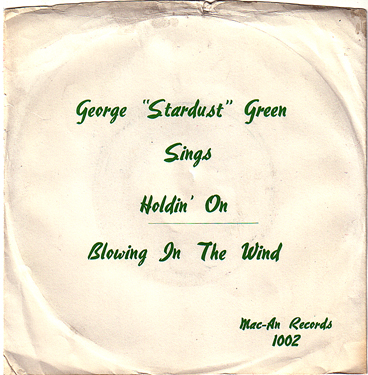
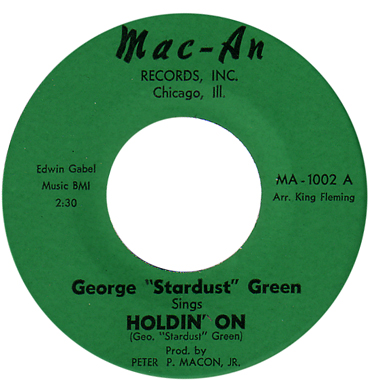
Reportedly the King Fleming Trio worked the Celebrity Lounge on a number of occasions in the early 1960s (the Celebrity, in the basement of the Maryland Hotel, 900 North Rush Street, had taken over in 1960 from the old Cloister Inn; see http://chicagocrimescenes.blogspot.com/2009/03/bobbie-arnsteins-death-at-maryland.html). On May 17, 1963, King Fleming and his Trio opened the new Pan-Am Room in the Graemere Hotel, 3400 West Washington, along with singer Jo An Henderson. A captioned photo of Henderson said that she (though not Fleming) was just back from a gig in Las Vegas; the ad also mentioned that in 1962 she had sung for 12 weeks, at Jazz Ltd., a club not often mentioned in the Chicago Defender ("Songbird on Westside," May 18, 1963, p. 10.). A brief article announcing the opening noted that Fleming had "previously worked the Sutherland Lounge, the Flame in Duluth, the Backstage in San Francisco, and the Baby Grand in New York" ("New Night Club to Open in Westside Hotel," Chicago Defender, May 15, 1963, p. 16).
By the time he made his Mac-An session, Green had been working off and on since 1956 or 1957 in the Amazzing Trio, with Bob Knowles at the piano and Dolphus Dean on bass. Probably some months later, he recorded a lounge LP for M&M as a vocalist, singing standards with the trio. He also landed a gig demonstrating songs for another small Chicago-based label; King Fleming again handled the studio band.
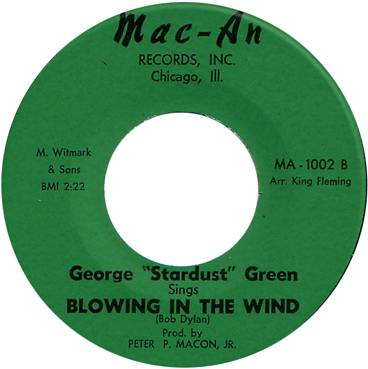
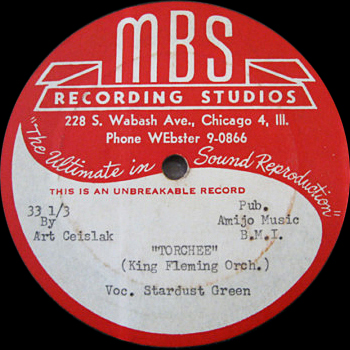
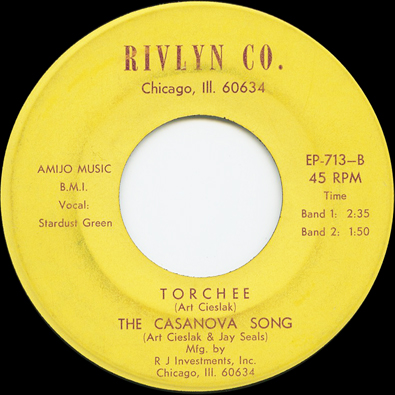
George "Stardust" Green (voc); King Fleming (p, dir, arr); other musicians unidentified; Will Jackson (arr)
MBS Studio, Chicago, August 26, 1963
| 63-8-26-A | Did You (Giampa) | Rivlyn EP-713-A, Rivlyn 713-A* | |
| Love Has Had Its Holiday (Giampa) | Rivlyn EP-713-A, Rivlyn 713-B* | ||
| 63-26-8-B | Torchee (Cieslak) | Rivlyn EP-713-B | |
| The Casanova Song (Cieslak-Seals) | Rivlyn EP-713-B |
A curious 45-rpm EP on an otherwise unknown label, Rivlyn, uses George Green to demonstrate four middle-of-the-road pop songs by two aspiring tunesmiths named Joseph Giampa and Art Cieslak. The EP label provides much more detail about the songs, their composers, and the music publisher than it does about the performers. There was also a conventional 2-tune 45 (also numbered Rivlyn 713!) of just the two Joseph Giampa songs; the label gives King Fleming some attention and also carries the notation "Arr. by W. Jackson."
Fleming and Jackson had known each other for years; in fact, it was Jackson who brought Richard Abrams to Fleming's attention back in 1955. Their collaboration would subsequently extend to a Johnny Nash LP and a Ramsey Lewis LP for Argo, and even to Fleming's final trio LP for Cadet.
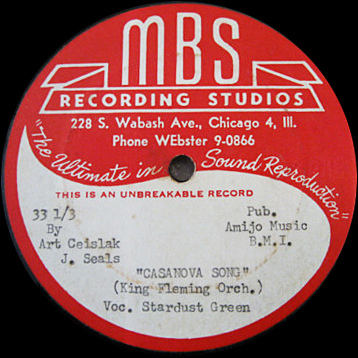
A 7-inch 33 1/3 rpm lacquer of the two Art Cieslak songs has surfaced (with full composer and publisher information duly typed on the label). It bears the imprint of MBS Recording Studios at 228 South Wabash Avenue and credits "King Fleming Orch." on both sides. Somebody made a nontrivial investment in getting the songs recorded, because on this occasion, King got a large studio band (brass, saxes, rhythm, and strings) to work with. We wonder whether there was a regular Rivlyn 45 for the Cieslak songs as well.
Our thanks to Dan Ferone for turning up the EP. The matrix numbers are incised in the trail-off vinyl on each side. The regular 45 with the Giampa songs turned up on ebay and a copy is now in the collection of Armin B&umml;ttner.
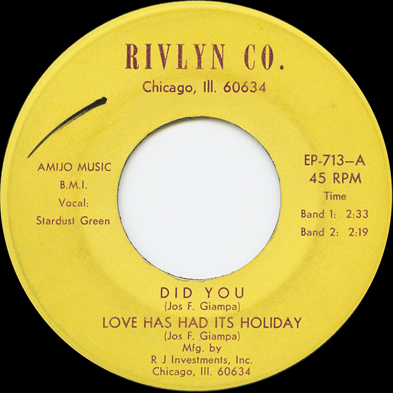
In 1963, Sonny Cohn commented about Fleming, "He's doing very well today with a group of his that both sings and plays.... You know, it's a funny thing about Chicago but you can drop out of the public eye and still be working steady. King's one of these" (Peter Vacher, "The Sonny Cohn Story," Jazz Journal, September 1963, p. 4.) Cohn's comment applies more to the late 1960s through the 1980s than to 1963, when he probably didn't realize that Fleming had a recording contract.
In February 1964, the Celebrity Lounge briefly adopted a big band policy. The big band was provided by Kai Winding (12 pieces, 5 of them trombones); the King Fleming Trio with Jo Ann Henderson alternated with Winding's ensemble (Will Leonard's column, Chicago Tribune, February 16, 1964, sec. 5 p. 14).
Fleming picked up further work as a studio arranger during his years with Argo.
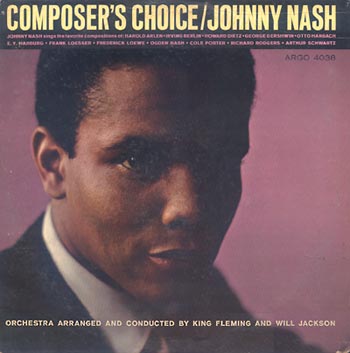
Johnny Nash (voc) accompanied by: unidentified (fl); King Fleming (p); unidentified (g); prob. Malachi Favors (b); prob. William "Bugs" Cochran (d); unidentified string section similar to the one from the next session; King Fleming (arr, cond); Will Jackson (arr, cond).
Universal Recording Studio, Chicago, June 12, 27 and 29, 1964
| One for My Baby | Argo LP4038 | ||
| Someone to Watch over Me | Argo LP4038 | ||
| Come to Me Bend to Me | Argo LP4038 | ||
| By Myself | Argo LP4038 | ||
| Last Night When We Were Young | Argo LP4038 | ||
| Speak Low | Argo LP4038 | ||
| Smoke Gets in Your Eyes | Argo LP4038 | ||
| 13286 | Always (Berlin) | Argo LP4038, Argo 5479 | |
| If There Is Someone Lovelier than You | Argo LP4038 | ||
| In the Still of the Night | Argo LP4038 | ||
| The Inch Worm | Argo LP4038 | ||
| Spring Is Here | Argo LP4038 |
The LP is so called because pop (later reggae) singer Johnny Nash is singing favorites that famous Broadway composers chose from their own oeuvre. The liner, written by Chicago Defender theatrical editor Dave Potter, describes King Fleming and Will Jackson as putting "their heads together" and coming up "with the swinging and inventive arrangements." They had previously worked together on the Rivlyn session.
Apparently, Composer's Choice has not been reissued on CD.
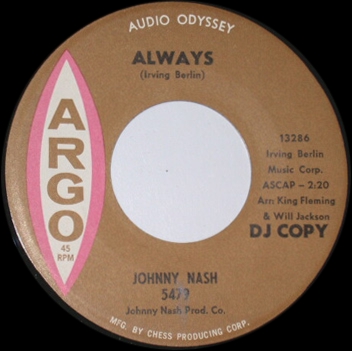
"Always" also saw release on Argo 5479, a 45-rpm single. The arrangement on this Irving Berlin composition is attributed to "King Fleming & Will Jackson" on the label. The matrix number is taken from the single. The other side, "Then You Can Tell Me Goodbye," is from a session a few weeks later, with arrangements by Johnny Pate.
In the midst of his work on the Johnny Nash sessions, King Fleming got a writeup in the Defender, which mentioned his studies under "the eminent professor Turner" at the Midwest Conservatory of Music and identified his current bandmates as Malachi Favors, who had been on his previous album for Argo, and Bugs Cochran, who would appear on his next and last for Cadet. The article proclaimed that Fleming had "toured all over the United States, Canada, and Mexico" and his "celebrated trio has recorded background music for Seeburg and has accompanied Johnny Nash." (The implication being that Fleming, Favors, and Cochran were on the LP sessions.) Their next engagement was said to be at DeLong's Motel in Chicago Heights, on July 3 (Sloane T. Letman, III, "The Most," Chicago Defender, June 20, 1964, p. 16).
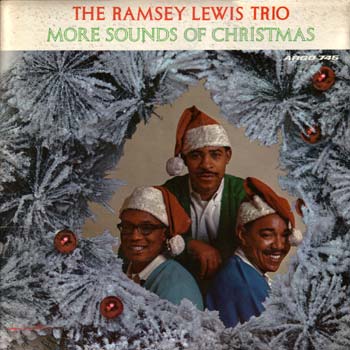
A few months later, King Fleming and Will Jackson were tapped to arrange some numbers for a Ramsey Lewis album. (Ramsey Lewis's first Christmas album had been arranged and conducted by Riley Hampton, and several other albums using larger orchestras and strings had been arranged and conducted by Richard Evans.)
Ramsey Lewis (p); Eldee Young (b); Isaac "Red" Holt (d); with Johnny Avant (tb); Sol Bobrov, David Chausow, Henry Ferber, Irving Kaplan, Mark Konorad, Harold Kupper, Abe Meltzer, Albert Muenzer, Harold Newton, Theodore Ratzer, Everett Zlatoff-Mirsky (strings); Pete Eagle (harp); King Fleming, Will Jackson (arr).
Chess Studios, Chicago, October 14, 1964
| 13476 | Snowfall | Argo LP745 | |
| 13477 | Rudolph, the Red Nosed Reindeer | Argo LP745, Cadet 5553 | |
| 13478 | Snowbound | Argo LP745 | |
| 13479 | The Twelve Days of Christmas | Argo LP745, GRP GRD 9796 [CD] | |
| 13480 | Little Drummer Boy | Argo LP745 |
All information from Tom Lord's Jazz Discography.
Argo 745, More Sounds of Christmas, was an LP released in December 1964. Cadet 5553 was a 45-rpm single released some time later (after the Argo label had its name changed to Cadet). GRP GRD 9796 was a various-artists Christmas CD probably released in 1997; it wrongly gave the recording date as October 1966.
Lord lists five more titles recorded the next day, but these were apparently made by the Ramsey Lewis Trio with some help from Cleveland Eaton (who played bass on one number while Eldee Young switched to cello) and did not involve trombone, strings, or harp.
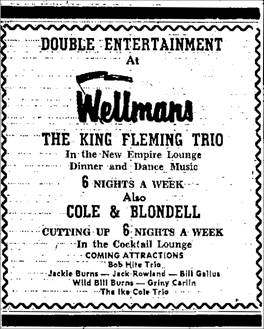
King Fleming spent a good portion of 1965 on the road with his trio. Just before going into the Chess (or Ter Mar) Studio for his third LP for Cadet (as the Argo label was now called), he was working in Valparaiso, Indiana. The Valparaiso Vidette-Messenger ran ads for the King Fleming Trio at Wellmans, on March 29 (p. 10) and April 8, 1965 (p. 24).
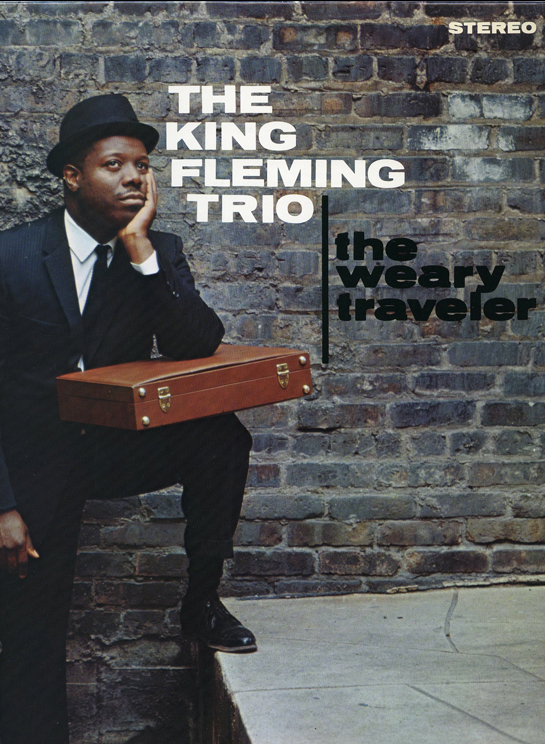
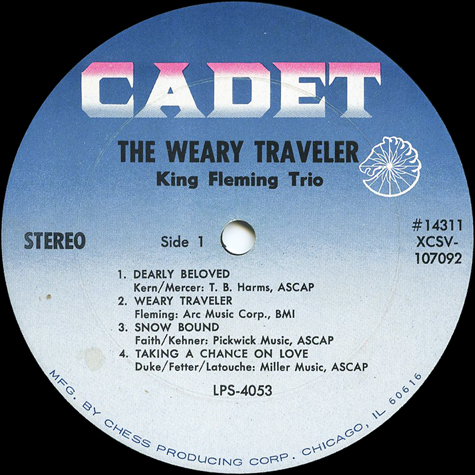
King Fleming (p, arr); Melvin Jackson (b); William "Bugs" Cochran (d); Will Jackson (arr).
Chess Studios, Chicago, April 1965
| 14311 XCSV107092-1A |
Dearly Beloved (Kern-Mercer) | Cadet LP-4053, Cadet LPS-4053, Fresh Sounds [Sp] FSR-CD 834 | |
| Weary Traveler (Fleming) | Cadet LP-4053, Cadet LPS-4053, Fresh Sounds [Sp] FSR-CD 834 | ||
| Snow Bound (Faith-Kehner) | Cadet LP-4053, Cadet LPS-4053, Fresh Sounds [Sp] FSR-CD 834 | ||
| Taking a Chance on Love (Duke-Fetter-Latouche) | Cadet LP-4053, Cadet LPS-4053, Fresh Sounds [Sp] FSR-CD 834 | ||
| 14312 XCSV107093-1B |
Green Leaves of Summer (Tiomkin-Webster) | Cadet LP-4053, Cadet LPS-4053, Fresh Sounds [Sp] FSR-CD 834 | |
| I Remember You (Schertzinger-Mercer) | Cadet LP-4053, Cadet LPS-4053, Fresh Sounds [Sp] FSR-CD 834 | ||
| Riff a Plenty (Fleming) | Cadet LP-4053, Cadet LPS-4053, Fresh Sounds [Sp] FSR-CD 834 | ||
| Walk Softly (Fleming) | Cadet LP-4053, Cadet LPS-4053, Fresh Sounds [Sp] FSR-CD 834 | ||
| One O'Clock Jump (Basie) | Cadet LP-4053, Cadet LPS-4053, Fresh Sounds [Sp] FSR-CD 834 | ||
| Darn It (Fleming) | Cadet LP-4053, Cadet LPS-4053, Fresh Sounds [Sp] FSR-CD 834 |
Cadet LP/LPS-4053, Weary Traveler, was released in May 1966, according to a listing in Billboard. Information about the LP is from a copy in Robert Campbell's collection. The liner notes indicate that this was King Fleming and Will Jackson's third collaborative effort as arrangers (the writer was obviously not aware of their outing for Rivlyn). Again, a variety of approaches was used on this LP; for instance, "Snow Bound" is played like a classical piece. "Walk Softly" is done quite differently from the version on Misty Night: strictly as a ballad, without the Latin vamp. On this LP, Fleming also returned to another old favorite, "One O'Clock Jump." It features the only instance we have caught of overdubbing on a King Fleming recording: on the LP, King's piano is always heard in the right channel, but momentarily a second piano part appears on the left.
Weary Traveler has finally been reissued, after 49 years, on Fresh Sounds [Sp] FSR-CD 834, a 2-CD set titled The King Fleming Trio. Whether master tapes were used as source material is not known, but the Weary Traveler tracks sound good as transferred.
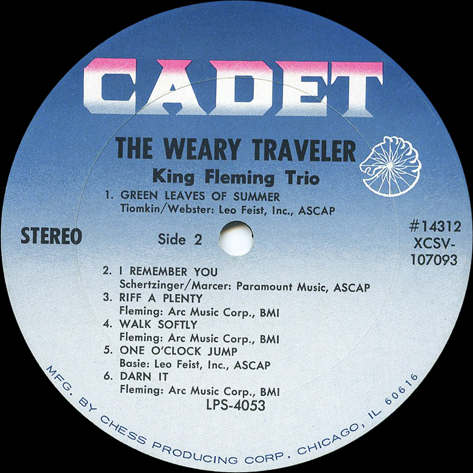
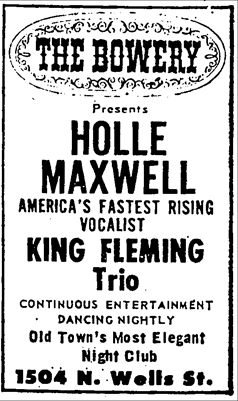
In July, King Fleming's trio was at the Bowery, 1504 North Wells, on a bill with singer Holle Maxwell (Chicago Defender, July 15, 1965, p. 18). On July 28, they opened at Chez Paree. On September 13, 1965, King Fleming's trio appeared at Troia's Steak House in Madison, Wisconsin (Wisconsin State Journal, September 10, 1965, Section 2, p. 9); the rest of the advertised musical entertainment was provided by rock and roll or polka bands. On the strength of his record deal, King Fleming ("'The Weary Traveler,' soon to be released") was among the showbiz figures tapped to appear at the Schenley Affiliated Brands Diamond Jubilee Holiday packaging preview, in the Defender building on November 18, 1965 ("Stars to Shine at Schenley Preview," Chicago Defender, November 18, 1965, p. 4). In September 1966, King Fleming was working five nights a week at the Maître d' Restaurant in Elk Grove Village (Chicago Daily Herald, September 1, 1966). He was at the Maître d' for most of the next year, although after a while he had to cut his trio back to a duo.
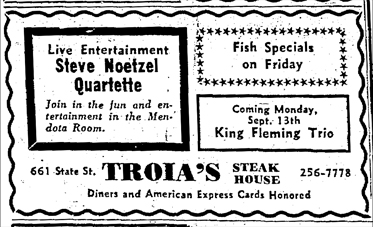
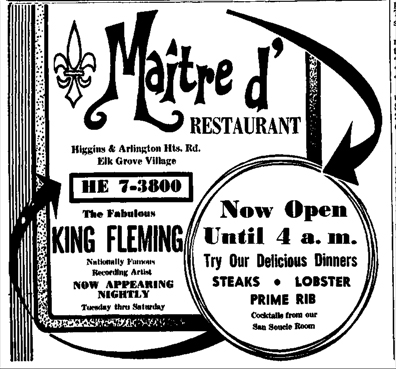
In the late 1960s, recording activity in Chicago moved sharply downward; Vee-Jay folded in 1966 and the Chess labels went downhill after the sale of the company to GRT and the death of Leonard Chess in 1969. Display ads for King Fleming's appearances became sporadic, and he would not make another record for 25 years. But he continued to lead a trio, as well as an octet and even a big band on occasions, and the trio kept working steadily.
In October 1969, the King Fleming Trio was at Mr. Edwards Restaurant and Lounge in Elk Grove Village (Chicago Tribune, October 22, 1969, sec. 1 p. 8).
In November 1973, the King Fleming trio was working the cocktail lounge at Fiddlers Supper Club in Mount Prospect, Illinois. On at least one occasion they accompanied a dance competition that ran several nights ("Look, they're dancin'," Chicago Daily Herald, November 16, 1973, Section 4, p. 1).
In 1974, King Fleming appeared at an event hosted by the Lutheran Church of the Holy Spirit, 1335 West 115th Street. A Sunday dinner dance at the Lutheran School of Theology, 55th and University, featured the King Fleming trio with a familiar singer, Jo An Henderson ("King Fleming trio,"Chicago Defender, April 20, 1974, p. 22). In 1977, King Fleming joined the Lutheran Church of the Holy Spirit, and in 1982 he became the church's choir director, in which capacity he would serve for 25 years.
Later that same year King Fleming was elected to the trial board of the Chicago Federation of Musicians, Local 10-208. On the same occasion, Sax Mallard was elected to the examining committee (Ted Watson, "Musicians vote: 4 win key union posts," Chicago Defender, December 16, 1974, p. 4).
Fleming teamed up again in the studio with George Green, first on a single for the F-M label, later on several tracks for an LP. (In the meantime, Green had made a single without Fleming for Gateway, around 1964). Judging from the inclusion of "What Are You Doing the Rest of Your Life," a song that got its premiere in a 1969 film, an approximate date can be established for the single.
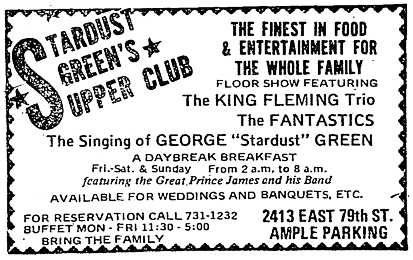
Around the time the single was cut, Green was running Stardust Green's Supper Club at 2413 East 79th Street. King Fleming's trio was part of the floor show for a while (as we can see from the Chicago Defender, October 2, 1970, p. 38).
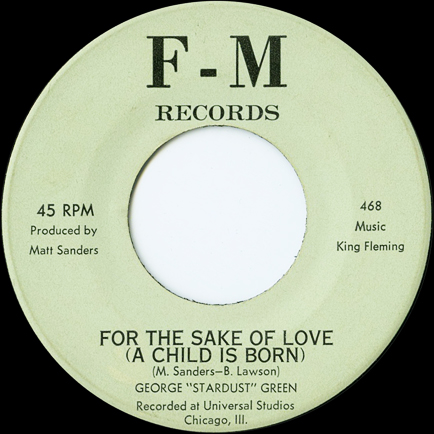
George Green (voc); King Fleming (p, arr, dir); unidentified (eb); unidentified (d); unidentified (string section).
Universal Recording, Chicago, c. 1970
| For the Sake of Love (A Child Is Born) (Sanders-Lawson) | F-M 468 | ||
| What Are You Doing the Rest of Your Life (Bergman-Bergman-Legrand) | F-M 469, Good Luck Records GLR 77-2 |
F-M 468/469 was a 45-rpm single released on a small Chicago label. There is no reference to Floyd Morris, who owned FM & PM, on the record. The main point of the release was to present Matt Sanders' soul ballad "For the Sake of Love"; Sanders is also credited as the producer on the 468 side, which further states "Music by King Fleming."
In 1977 or 1978, George Green released an LP on his own label, Good Luck Records. GLR 77, George "Stardust" Green: Feelings, used one side off this single, as well as "Feelings" from his outing for FM & PM (see the next session below). On the LP, Floyd Morris is cited as the arranger for "What Are You Doing" and King Fleming's presence on piano is not mentioned.
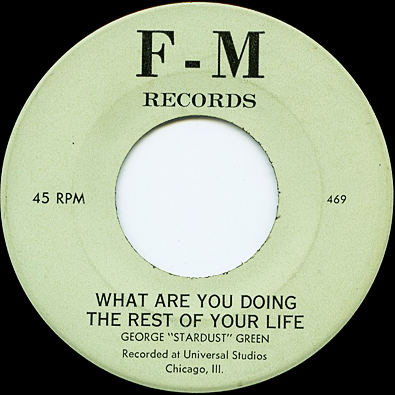
Despite the string section (small, recessed, and used sparingly), King Fleming's piano is well recorded and can be heard to advantage on this release. The other musicans sound like members of Fleming's working trio. Green becomes rather overripe in his rendition of the durable ballad "What Are You Doing," but redeems himself on the gospel-inflected "For the Sake of Love."
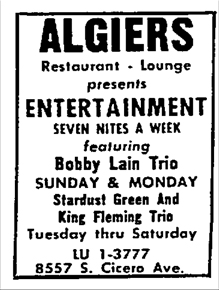
George Green was still working with Fleming a couple of years later. The Economist Newspapers for September 24, 1972 (p. 4CS) carried an ad for King Fleming's Trio with Stardust Green, playing 5 nights a week at the Algiers Restaurant and Lounge, 8557 South Cicero.
George Green issued a 45 rpm single, in 1975 or possibly a little later, on FM & PM 1111. There he slogs his way through an awful version of Morris Albert's "Feelings," as arranged by Floyd Morris (well, all right, has anyone ever done a good version of "Feelings"?). King Fleming was not involved.
In 1977 or 1978 George Green released a 10-track LP on his own Good Luck label; the back liners quote from a 1977 article and the copy shown at discogs.com is autographed for someone's birthday, June 24, 1978. Floyd Morris and King Fleming or "Flemming" were credited as producers. Well, not exactly—Matt Sanders had been listed as the producer on the F-M single. But Green obviously wasn't finding residual demand for his song "For the Sake of Love," which he left off the LP. We can identify "What Are You Doing" as done with Fleming, and "Feelings" as done with Floyd Morris. Our listing gives all 10 titles for completeness, but so far as we know, King Fleming appeared on 4 of them.
The title for Green's homebrew LP has been given as Feelings, and maybe that's what appeared on some covers. The copy that can be seen at the discogs website (complete with labels and both covers) has the title shown below. The sides are designated as GLR 77-1 and GLR 77-2.
George "Stardust" Green (voc); King Fleming (p, arr -1; p -2); Floyd Morris (arr -2; p, arr -3); other musicians unidentified.
Odyssey Studios, Chicago, c. 1970 to 1977
| Don't Misunderstand -3 | Good Luck Records GLR 77-1 | ||
| Aloila -3 | Good Luck Records GLR 77-1 | ||
| Feelings (Alpert) -3 | FM & PM 1111, Good Luck Records GLR 77-1 | ||
| Try a Little Tenderness -3 | Good Luck Records GLR 77-1 | ||
| Candyman -1 | Good Luck Records GLR 77-1 | ||
| The Reefer Song -3 | Good Luck Records GLR 77-2 | ||
| Roni-Jo -3 | Good Luck Records GLR 77-2 | ||
| Fallin' in Love with Love -1 | Good Luck Records GLR 77-2 | ||
| What Are You Doing the Rest of Your Life -2 | F-M 469, Good Luck Records GLR 77-2 | ||
| I'll Go My Way by Myself -1 | Good Luck Records GLR 77-2 |
We've listed the tracks in the order of their appearance on the LP. Obviously not everything was recorded at the same session: "What Are You Doing" appears to be from the Fleming24, above, and "Feelings" from a different session made around 1975. Green credits King Fleming with "Piano & Arr." on "Candyman," "Fallin' in Love with Love," and "I'll Go My Way."
Suffering from heart trouble, George Green retired from performing in the early 1990s. He died at his home in Henderson, Nevada, on March 11, 2007.
In 1983, Fleming formed the last enduring edition of his trio with Clifford Griffin (bass, electric bass) and William "Bugs" Cochran (drums). Clifford Griffin had previously worked with Nancy Wilson and Erroll Garner, among others. Bugs Cochran grew up at 54th and Prairie, in the same neighborhood where Sun Ra and John Gilmore were living in the 1950s; he recorded with the Sun Ra Arkestra from 1956 to 1959, worked with Gene Ammons, Von Freeman, Cozy Eggleston, Willie Jones, and the John Young Trio, and had already spent time in two editions of the King Fleming Trio during 1964 and 1965. When the money was there to support a quartet, Fleming added Bubba Mitchell on alto sax.
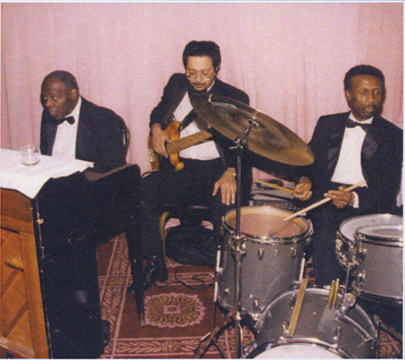
The Chicago Tribune, September 1, 1985, reported on the Seventh Annual Chicago Jazz Fest, where the King Fleming Trio was featured with "guest" tenor sax players Boots Robinson and E. Parker McDougal. (McDougal was a regular at the Chicago Jazz Festival during the 1980s.)
The Chicago Tribune for June 27, 1986 had the King Fleming Trio performing at Taste of Chicago on June 30. In June 1990, the trio was playing Christys Fine Dining in Glenview (Chicago Tribune, June 15, 1990, sec. 7 p. 52 N). The King Fleming Trio worked regularly at Pops for Champagne in Chicago from 1987 through at least 1996; for instance, on March 14, 1996 King Fleming was included in a week-long celebration of pianists at Pops.
King Fleming undertook a bigger project when he composed the jazz score for "A New Leaf," a new black musical by Warren St. James, which had its premiere May 24-26, 1991 at the New Regal Theater, 1645 East 79th Street (announced in the Tribune, May 9, 1991).
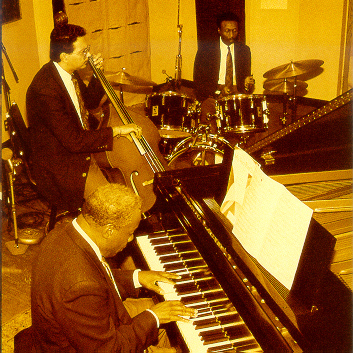
The Tribune for December 31, 1993 had the trio at Carlucci's (6111 North River Road, in Rosemont). In 1996 the trio continued to appear at Carlucci's and was also working at Philander's in the Carlton Hotel, Oak Park, Illinois (where they had recently begun an engagement; according to the Chicago Daily Herald, December 29, 1995, Section 6, p. 33, King Fleming's Trio was appearing at 9:30 each Friday night). The King Fleming Trio would play at Philander's every Friday night for nearly a decade.
King Fleming's long-delayed return to the studio took place on his own initiative, after a long period during which the only offers he got were to make more sides like the ones he had done with George Green; wanting to record his own compositions, he turned these down. He approached Bradley Parker-Sparrow and Joanie Pallatto about recording on their Southport label, which had been in business for nearly a decade by that time:
Back in 1995, King Fleming approached my husband and partner, Bradley Parker-Sparrow and me about doing a recording, his first CD for Southport King! The King Fleming Songbook. … I suppose after such a long hiatus from the recording studio, he was eager to document his music again. … It was a wonderful project, from start to finish—the music, the musicians, liner notes by the inimitable Larry Smith, the photo shoot (by Sparrow), the art design (by Al Brandtner) and packaging ... we all became fast friends! (Joanie Pallatto, email communication, April 12, 2014)
King Fleming (p, comp); Clifford Griffin (eb -1; b -2); Bill Cochran (d); Joanie Pallatto (voc); April Aloisio (voc).
Sparrow Sound Design, Chicago, April 23, 1995
| Once Is Enough (Fleming) -1 | Southport S-SSD 0041 [CD] | ||
| Time Out (Fleming) -2 | Southport S-SSD 0041 [CD] | ||
| Bypass (Fleming) -2 | Southport S-SSD 0041 [CD] | ||
| You and Only You (Fleming) -2 | Southport S-SSD 0041 [CD] | ||
| Rive Gauche (Fleming) -1 | Southport S-SSD 0041 [CD] | ||
| That's Tough (Fleming) -2 | Southport S-SSD 0041 [CD] | ||
| Prelude in C Minor (Fleming) -2 | Southport S-SSD 0041 [CD] | ||
| Eastgate (Fleming) -2 | Southport S-SSD 0041 [CD] | ||
| A Fallen Leaf (Fleming) -2 | Southport S-SSD 0041 [CD] | ||
| Loving You (Fleming) -1 | Southport S-SSD 0041 [CD] | ||
| With All My Love (Fleming) -2 | Southport S-SSD 0041 [CD] | ||
| Great Life (Fleming-Abrams) -2 | Southport S-SSD 0041 [CD] | ||
| Our Love (Fleming) -2 | Southport S-SSD 0041 [CD] | ||
| Misty Night (Fleming) -2 | Southport S-SSD 0041 [CD] | ||
| Little Caesar (Fleming) -1 | Southport S-SSD 0041 [CD] | ||
| Have a Merry Christmas (Fleming) [JP, AA voc] -2 | Southport S-SSD 0041 [CD] |
King! was released in September 1996. All of our information is from the liner notes to this CD—except that Clifford Griffin switches to electric bass on some tracks. All compositions are by King Fleming, except "Great Life" by King Fleming and Muhal Richard Abrams. Joanie Pallatto did the vocal arrangement for "Have a Merry Christmas." April Aloisio made three CDs of her own for Southport during this period.
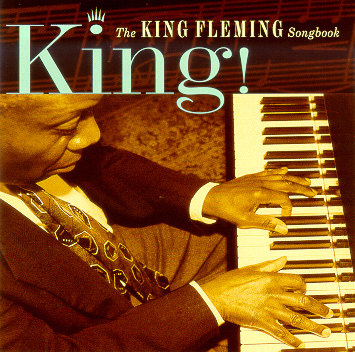
In March 1996, King Fleming was part of a parade of Chicago jazz pianists who appeared at Pops for Champagne to celebrate its 14th anniversary (Howard Reich, "Jazz: Keys to the City," Chicago Tribune, March 3, 1996, sec. 7 p. 4). Fleming was set for March 14, after Jodie Christian (March 12) and John Young (the 13th).
For several years, the King Fleming Trio worked Friday nights at Philander's in Oak Park. Robert Pruter attended a night of music by the trio on July 9, 1999. The King Fleming Trio typically played from 8:30 pm to 1:30 am, in three sets of 12 or 13 tunes each. Here is the review:
King Fleming's club appearances feature his secret weapon—his singing. Vocal numbers on this occasion included "I've Got You under My Skin," "Red Sails in the Sunset," "To Each His Own," and "After the Loving." His basic vocal style somewhat resembles Bobby Short's, but he also performed "Kansas City" in a Joe Williams manner, and did the inevitable Satchmo impression on "What a Wonderful World."
The instrumentals included "An Affair to Remember," which the trio played straight, versions of "People," "I Got Rhythm," and "Satin Doll" with some improvisation, and numbers with adventurous improvisation such as "Have You Met Miss Jones?" and Fleming's own "Between the Toes." The band also has an exact replica of "The In Crowd" in its repertoire.
King Fleming's second and final Southport CD, a collaboration with Joanie Pallatto, was also originally his idea.
King stopped by the studio for a visit in 2000, and proclaimed, "Joanie, I want to do a new recording with you, and you're gonna write the lyrics to my songs." … Well, at that time, I was so surprised, I didn't even know if I was capable of the task at hand. … King seemed to know more about me than I did at that point. … We proceeded, and the result was The King and I (a wonderful title, named by Sparrow). … Another Chicago treasure, writer Rick Kogan (Chicago Tribune, WGN Radio) wrote the liner notes. … A great photo shoot, again by Sparrow (King preferred the original color photos, but our talented designer, Al Brandtner, created a very cool graphic in shades of blue and yellow.) … We enlisted some great musicians to play along with King's trio of Clifford Griffin on bass & Bill Cochran on drums. … We invited Von Freeman on tenor sax, Bobby Lewis on trumpet and flugelhorn, and Rich Fudoli on flute and soprano sax to join us. … My personal favorite is the ballad "Moody." … An additional note: when I wrote the lyrics, I used King's titles that were already in place. … That made the concept of the piece easy! (Joanie Pallatto, email communication, April 12, 2014)
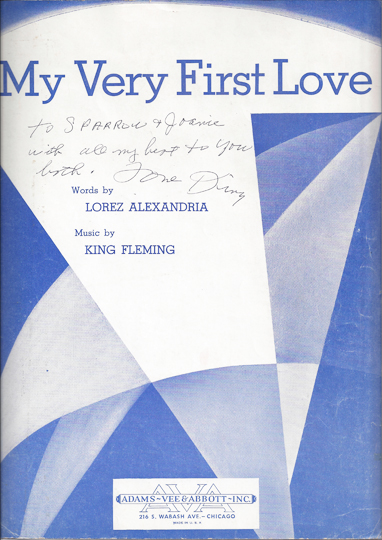
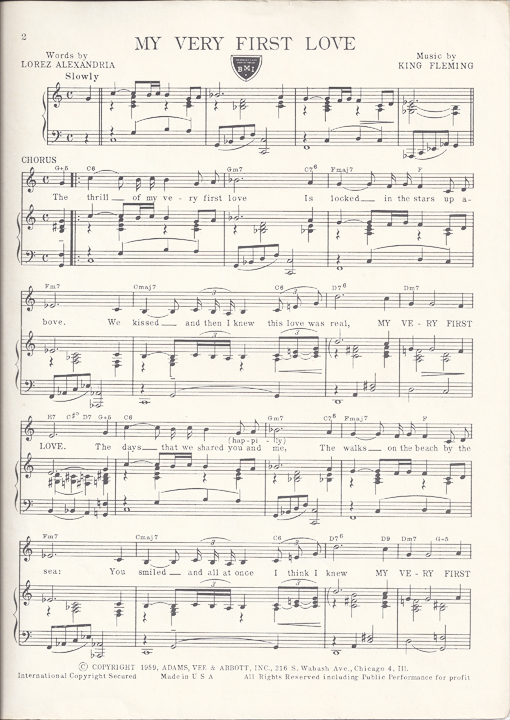
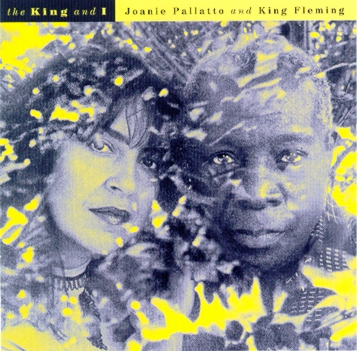
Joanie Pallatto (voc); Bobby Lewis (tp -1; flg -2); Von Freeman (ts -3); Rich Fudoli (fl -4; ss -5); King Fleming (p, voc); Clifford Griffin (b); William "Bugs" Cochran (d).
Sparrow Sound Design, Chicago, March 29, March 30, and May 31, 2000
| You're Driving Me Crazy (Donaldson) -3 [JP voc] | Southport S-SSD 0084 | ||
| Moody (Fleming-Pallatto) [JP voc] | Southport S-SSD 0084 | ||
| Somebody Loves Me (Gershwin-DeSylva-McDonald) -1 [JP, KF voc] | Southport S-SSD 0084 | ||
| Opportunity for Love (Fleming-Pallatto) -4 [JP voc] | Southport S-SSD 0084 | ||
| Eastgate (Fleming-Pallatto) [JP voc] | Southport S-SSD 0084 | ||
| My Very First Love (Fleming-Alexandria) -3 [JP voc] | Southport S-SSD 0084 | ||
| Overt (Fleming) -5 | Southport S-SSD 0084 | ||
| Bypass (Fleming) [JP voc] | Southport S-SSD 0084 | ||
| Snow Storm (Fleming-Pallatto) -2 [JP voc] | Southport S-SSD 0084 | ||
| Oooo, Those Blues (Fleming-Pallatto) -3 [JP voc] | Southport S-SSD 0084 | ||
| Pen Point (Fleming) | Southport S-SSD 0084 | ||
| A Beautiful Friendship (Kahn-Styne) [JP voc] | Southport S-SSD 0084 | ||
| You, and Only You (Fleming) [JP voc] | Southport S-SSD 0084 | ||
| Adios (Madriguera-Woods) -4 [JP voc] | Southport S-SSD 0084 |
King Fleming's second CD, Southport S-SSD 0084, was released on October 21, 2000. Ten of the tunes are King Fleming compositions (5 of them, in turn, have new lyrics by Joanie Pallatto). Our information is from the CD leaflet. King Fleming's one vocal outing on the CD, like others going back many years, is a stealth appearance—neither mentioned nor credited in the notes!
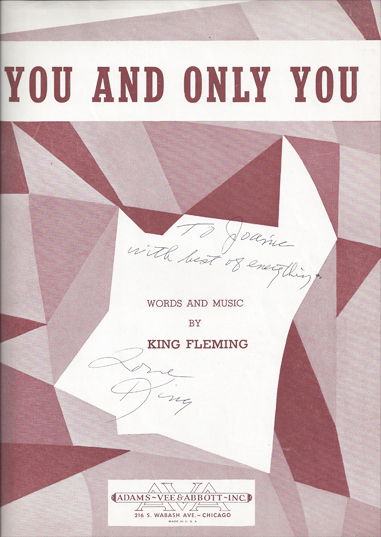
King Fleming's old collaborator Lorez Alexandria made two LPs in Los Angeles for Impulse in 1964; these featured some top jazz musicians, and a lot of production. The jazz recession of the late 1960s kept her out of the studios, but she returned at some point in the early 1970s on a label called Pzazz, then made an album in 1977 with a big band for the Japanese Trio label. From 1978 through 1987, she was affiliated with the Discovery/Trend operation in Southern California, for which she cut 6 albums; she also did one for Japanese Sony in 1986. Her last two CDs were made in 1990 and 1993 for the Muse label. Lorez Alexandria retired from performing in 1996, suffered a disabling stroke in 1998, and died of kidney failure in Los Angeles on May 22, 2001.
King Fleming worked regularly through 2003. He suffered two strokes in 2004, and effectively retired in 2005, at the age of 83, though he continued to direct the choir at his church for another two years, and he made at least one public appearance in 2007 (an interview on WBEZ-FM featured him and Bradley Parker-Sparrow, in connection with an upcoming event). His wife Cornelia died in November 2013; they had been married for 66 years.
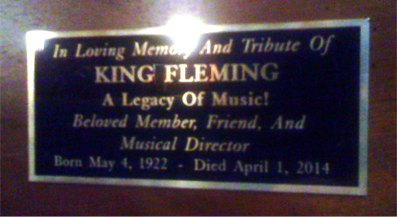
King Fleming died at the Illinois Home for Veterans in Manteno, Illinois, on April 1, 2014, at the age of 91. He was survived by his brother Jeffrey Fleming and his sister Alberta Simpson, his sons Kevin and Dwight Fleming, and four grandchildren. His memorial service, on April 21 at the Lutheran Church of the Holy Spirit, included a musical tribute with his old bandmates Clifford Griffin and Bugs Cochran, joined by Michael Price and another guest pianist, Bubba Mitchell on alto sax, Ray Bailey on tenor, and Joanie Pallatto on vocals. King had bequeathed his own piano to the church. He was buried at Abraham Lincoln National Cemetery, in Elwood, Illinois. (We are indebted to Kevin Fleming and Joanie Pallatto for news of his death; Howard Reich's obituary in the Chicago Tribune,http://articles.chicagotribune.com/2014-04-03/entertainment/chi-king-fleming-dead-20140403_1_pianist-chess-records-king-fleming, provided some additional information. A beautifully produced program for his memorial service told us much more about his life and family, and Joanie Pallatto and Alvin Carter-Bey allowed us to use their photos from the event.)
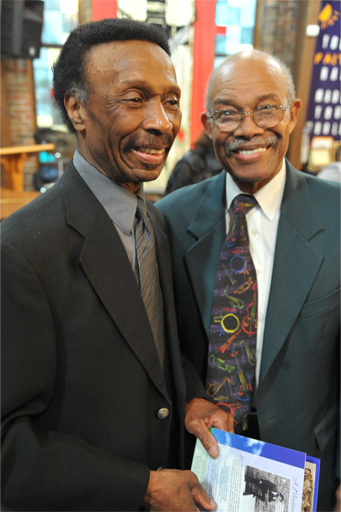
Larry Smith's liner notes to King Fleming's first Southport CD provided some biographical details. Most of our other information about King Fleming's career is drawn from his conversations in 1999 with Robert Campbell and Robert Pruter, from Peter Vacher's article "The Sonny Cohn Story" (Jazz Journal, September 1963), and the program for his memorial service. Thanks also to the late Vernel Fournier for his comments, to Dan Ferone for alerting us to the George Green singles on Mac-An, Rivlyn, and F-M, and to Joanie Pallatto for background on King Fleming's Southport sessions and for the sheet music reproduced here.
Click here to return to Red Saunders Research Foundation page.